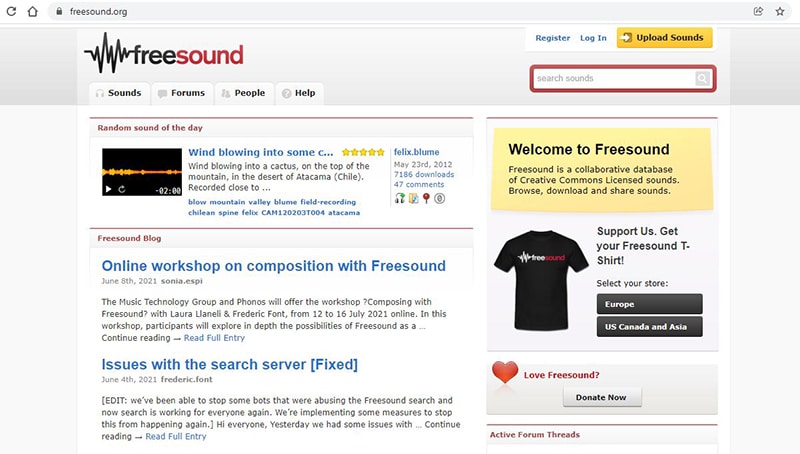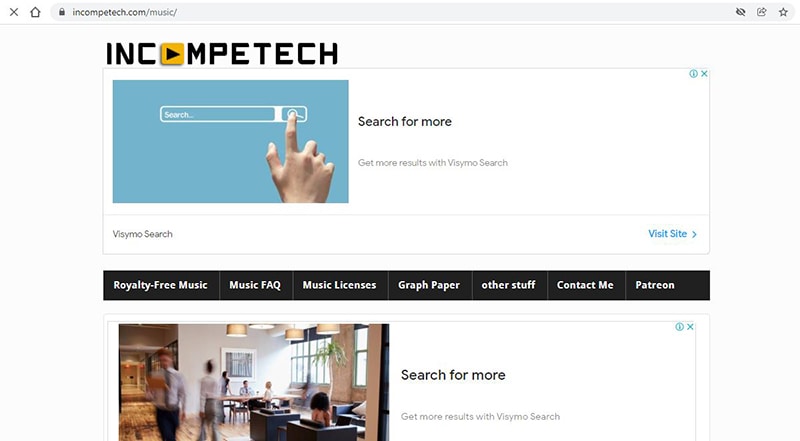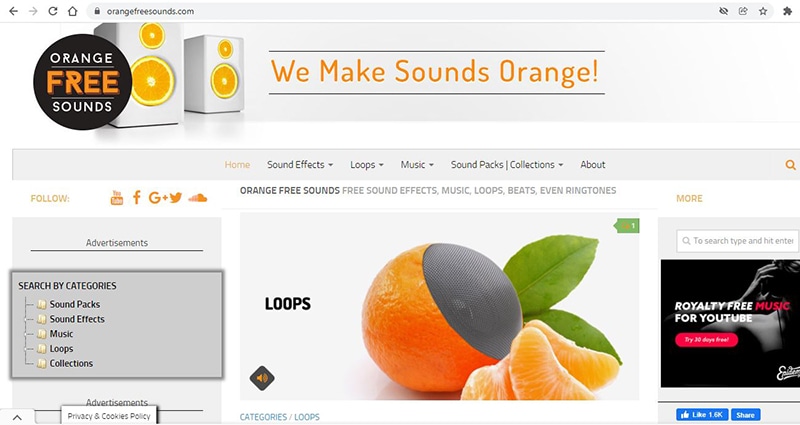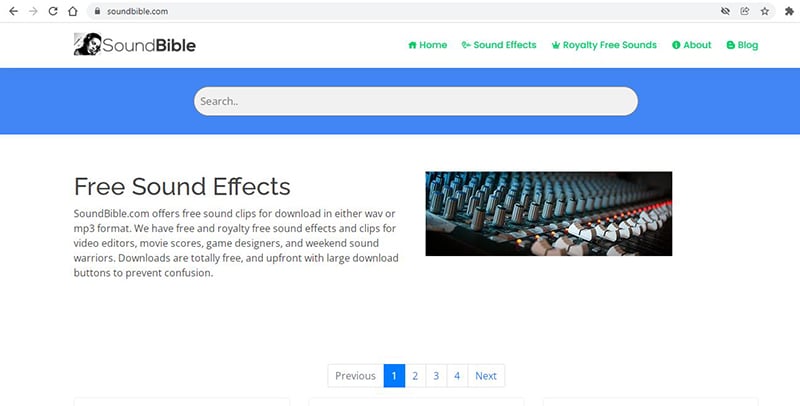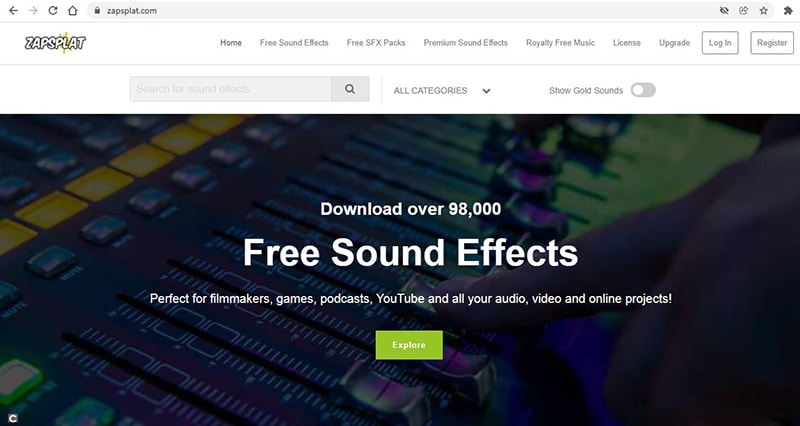:max_bytes(150000):strip_icc():format(webp)/how-to-add-tiktok-filters-and-effects-f3c195b2fe1449cb8b2906eea3305b22.jpg)
Updated Exploring Sources of High-Frequency Glass Disintegration Sounds

Exploring Sources of High-Frequency Glass Disintegration Sounds
Versatile Video Editor - Wondershare Filmora
An easy yet powerful editor
Numerous effects to choose from
Detailed tutorials provided by the official channel
There are a few different places where you can find glass-breaking sound effects. One place is online, on websites like SoundCloud or YouTube. Many apps offer glass-breaking sound effects as part of their library of sounds. A quick internet search will reveal various sites to download these effects for free.
Keep in mind that not all of these sites are completely free. Some of them will only offer free glass-breaking sound effects for certain uses, while others may limit how many times you can use their sounds before charging a fee.

You can also find glass-breaking sounds in libraries of sound effects. These collections are available for purchase, or they may be available to download for free. If you are looking for a specific sound effect, it is often easiest to search for it by name. This will help you to find the right sound effect quickly and easily.
Finally, if you have access to a recording studio, you can record the sound yourself. In this article, we are going to help you with the whole matter with step by step guide. So read on to know more!
In this article
01 [Ways to Download All Kinds of Sound Effect](#Part 1)
02 [Use Filmora to Add Background Music in Your Video](#Part 2)
Part 1 Ways to Download All Kinds of Sound Effect
Among many ways to download or create all kinds of sound effect including glass breaking/shattering sound effect, here are some of the ways for you to follow –
1. Freesound
This site has thousands of sound effects available under the Creative Commons 0 license. This means that they can be used for any purpose, personal or commercial, without attribution or permission required. To download music from Freesound, follow these steps.
Step 1: Go to the Freesound website.
Step 2: Search for the sound you want to download.
Step 3: Click on the sound to listen to it.
Step 4: Click on the Download button.
Step 5: Save the sound to your computer.
2. Incompetech
This site offers royalty-free music and sound effects used in a commercial or non-commercial project. All of the sounds are available for download in MP3 format.
Step 1: First of all, go to Incompetech and open up any page on the site. You’ll see that there are links on the left side.
Step 2: Click on one of those links, and you’ll see a list of songs of that category. Once again, click on one of the songs to open up another page where you can listen to it.
Step 3: Once you’re done listening, scroll down, and you’ll see a link that says “Download this song”. Click on the link, and it will start downloading automatically.
Step 4: Once downloaded, go into your project and put in the music track where you want the song to go in. If you want a song to be longer, re-download the song and find that “Download this song” link again. Put it where you want the new end of the music to be.
3. Orange Free Sounds
This site offers various sound effects that are free to download and use in your projects. The sound effects are available in MP3 format and can be used for personal or commercial purposes. Here is how to download a video from orange free sounds step by step.
Step 1: Go to the URL of the video. The URL is the address of the video that you want to download. Copy it and paste it in a new tab or window if your browser doesn’t automatically do it for you.
Step 2: The next step is to go to a website called SaveFrom.net. When the page has loaded, look for the big blue button that says “Download Video”. A new tab or window will open with the download page. It would be best to paste the video URL in the “Enter a video URL” bar.
Step 3: After pasting it, click on “Download this video” (the blue button). When it appears, press on one of them. I usually go for mp3 format because it keeps good quality and it’s the most used format that you can play on many devices.
Step 4: The next step is to wait until it downloads. Depending on your connection speed, it may take a few minutes, but it usually doesn’t even take one minute to download 100Mb videos. When it has finished downloading, look for the green button that says “Download to your computer” (you may have to scroll down the page).
Step 5: Click on it, and it will start downloading. You can click on “Open folder” or let it open automatically when the download is finished. When the download finishes, you can play it with any audio player that supports mp3 files.
4. SoundBible
This website offers free sound effects that can be downloaded and used in your projects. The sound effects are available in MP3 format and can be used for personal or commercial purposes. There is a free option and a premium option. Here is how to use SoundBible for collecting sound effects.
Step 1: Open SoundBible website.
Step 2: Look for the download button, which is located in the upper right-hand corner of your screen.
Step 3: Click on it to open another drop-down menu with “Royalty” and “Free” options, click the “Free” option.
Step 4: Scroll down to the bottom of the page.
Step 5: Click “Download”.
Step 6: You will be able to download your sound effect onto your computer.
Please note: These glass-breaking sound effects are in .mp3 format and can be used freely in your video games and animated projects under the terms of the Attribution 3.0 license.
5. ZapSplat
This website offers a wide variety of sound effects that are free to download and use in your projects. The sound effects are available in WAV format and can be used for personal or commercial purposes.
Step 1: Go to Zapslat website, click on ZapSplat.
Step 2: Type the name of your project, then go to the search tab and find your project.
Step 3: When the video has finished importing, you can change the playback speed and add effects.
Step 4: To export your project, click on the share button and select “Download”. You can then save your video to your computer.
Part 2 Use Filmora to Add Background Music in Your Video
Filmora is an easy video editing software that is easy to use and has a wide range of features. It is available for both Windows and Mac users. Some of the features of Filmora include adding text, music, and filters to your videos. You can also create slideshows, animated titles, and green screen effects. Filmora has a glass-breaking effect. This can be added to your video to give it a dramatic ending or a thrilling start. It can signify the end of a relationship or other momentous occasion. You can choose from different types of glass-breaking sound effects, like champagne glasses clinking together, breaking glass, or the sound of a window shattering.
Features:
- The software features a manual mode for advanced control over the video editing process and express mode for quick and easy creation of videos. It also supports 4K video editing.
- One of the program’s most distinctive features is the glass-breaking sound effect. When a clip is edited and played back, this sound can be heard whenever the clip is paused or stopped. This effect was added to make the editing process more realistic.
- Another distinctive feature of Filmora is the glass shutter sound effect. This sound can be heard when a clip is edited and played back. It was added to make the editing process more realistic and enhance the user’s experience.
- If you are looking for video editing software that offers a realistic editing experience, Filmora is the right choice for you. It features two unique sound effects that add a touch of realism and make the editing process more exciting.
Some features include adding text, music, and audio effects and creating titles and intro/outros.
Step by Step Guide for How to Add Sound Effects to Video With Filmora:
Step 1: Go to the Filmora official website, install wonder share Filmora and lunch it. Once it’s launched, you will find a tab just below the menu bar, tap media, and click import. After this, there will be a drop-down where you can click on import media files and choose the video file. Repeat the process to pick the desired background music. You can also use build-in music tracks to add music to your video by selecting the Music tab.
For Win 7 or later (64-bit)
For macOS 10.12 or later
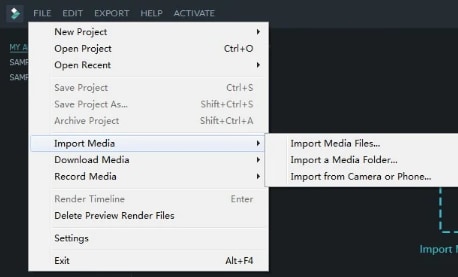
Step 2: Now you can navigate over the video you imported to Filmora, then tap on the sign ‘+’on it alternatively; you can drag down to the timeline the media file.
Step 3: Now edit your music by double-tapping the audio from the timeline. It will display the audio panel at the top of the screen. You can use it to set the desired equalizer, manage pitch volume and speed. You can also use the forum to fade in or fade out.
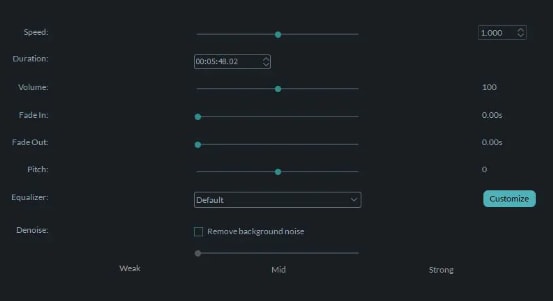
Step 4: Finally, you can now export the video that has made the desired changes by clicking ‘export’ on the toolbar to export the video. You can now save the exported in the desired format and remember to rename it directly.
Wondershare Filmora
Get started easily with Filmora’s powerful performance, intuitive interface, and countless effects!
Try It Free Try It Free Try It Free Learn More >

AI Portrait – The best feature of Wondershare Filmora for gameplay editing
The AI Portrait is a new add-on in Wondershare Filmora. It can easily remove video backgrounds without using a green screen or chroma key, allowing you to add borders, glitch effects, pixelated, noise, or segmentation video effects.
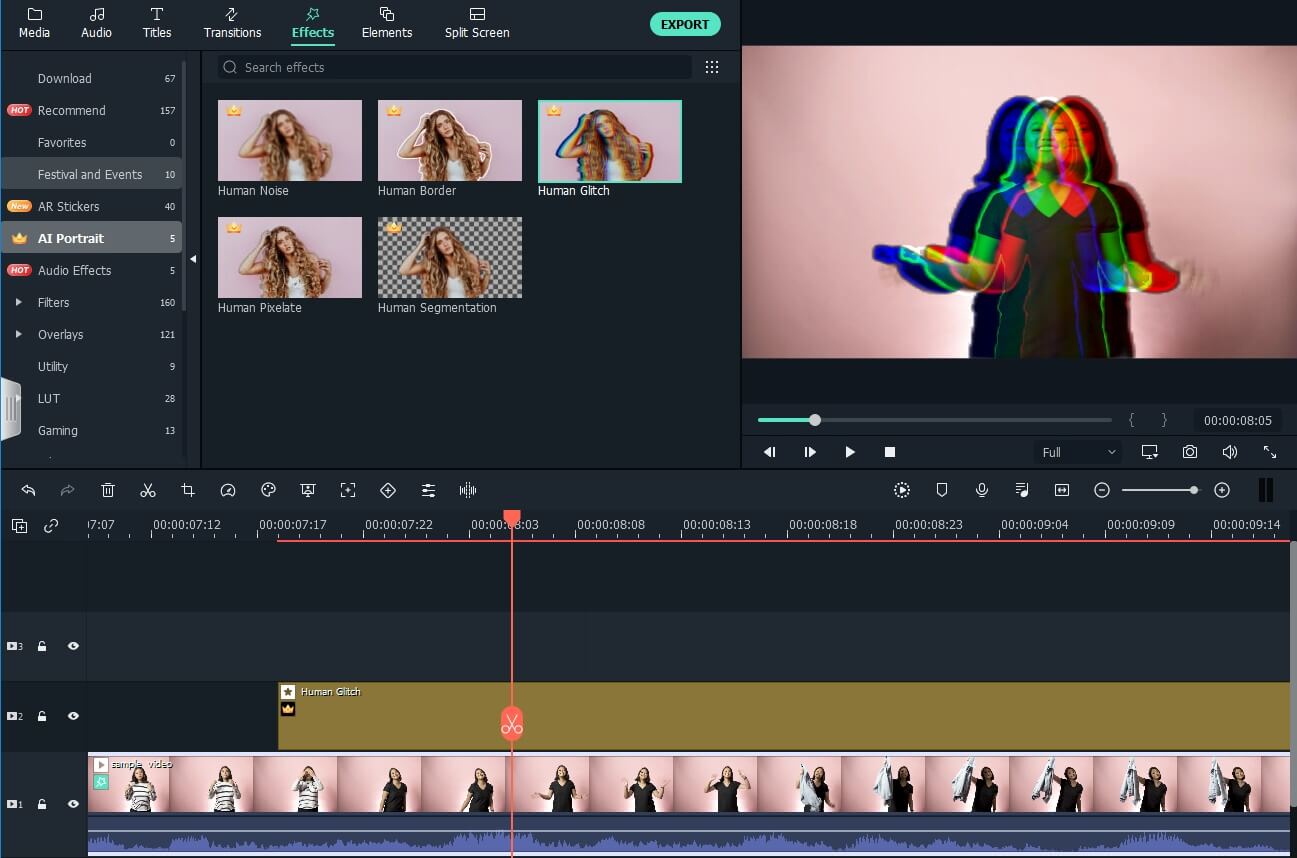
Conclusion
Glass-breaking sound effects are a great way to give your video or project some real, dramatic flair. These sounds for free online. Do an internet search, and you’ll come up with plenty of sites that offer them as downloads. Note that not all of those websites will be completely free; those that only provide their glass-breaking sounds for certain uses may charge a fee after using it more than a certain number of times.
Filmora is a video editing program that’s simple enough for beginners but powerful enough to satisfy even the most advanced editors. With features like manual mode and glass-breaking sound effects, you can easily create videos. Hope this article helps you with collecting glass breaking/shattering sound effects and adding them into videos using Filmora.
There are a few different places where you can find glass-breaking sound effects. One place is online, on websites like SoundCloud or YouTube. Many apps offer glass-breaking sound effects as part of their library of sounds. A quick internet search will reveal various sites to download these effects for free.
Keep in mind that not all of these sites are completely free. Some of them will only offer free glass-breaking sound effects for certain uses, while others may limit how many times you can use their sounds before charging a fee.

You can also find glass-breaking sounds in libraries of sound effects. These collections are available for purchase, or they may be available to download for free. If you are looking for a specific sound effect, it is often easiest to search for it by name. This will help you to find the right sound effect quickly and easily.
Finally, if you have access to a recording studio, you can record the sound yourself. In this article, we are going to help you with the whole matter with step by step guide. So read on to know more!
In this article
01 [Ways to Download All Kinds of Sound Effect](#Part 1)
02 [Use Filmora to Add Background Music in Your Video](#Part 2)
Part 1 Ways to Download All Kinds of Sound Effect
Among many ways to download or create all kinds of sound effect including glass breaking/shattering sound effect, here are some of the ways for you to follow –
1. Freesound
This site has thousands of sound effects available under the Creative Commons 0 license. This means that they can be used for any purpose, personal or commercial, without attribution or permission required. To download music from Freesound, follow these steps.
Step 1: Go to the Freesound website.
Step 2: Search for the sound you want to download.
Step 3: Click on the sound to listen to it.
Step 4: Click on the Download button.
Step 5: Save the sound to your computer.
2. Incompetech
This site offers royalty-free music and sound effects used in a commercial or non-commercial project. All of the sounds are available for download in MP3 format.
Step 1: First of all, go to Incompetech and open up any page on the site. You’ll see that there are links on the left side.
Step 2: Click on one of those links, and you’ll see a list of songs of that category. Once again, click on one of the songs to open up another page where you can listen to it.
Step 3: Once you’re done listening, scroll down, and you’ll see a link that says “Download this song”. Click on the link, and it will start downloading automatically.
Step 4: Once downloaded, go into your project and put in the music track where you want the song to go in. If you want a song to be longer, re-download the song and find that “Download this song” link again. Put it where you want the new end of the music to be.
3. Orange Free Sounds
This site offers various sound effects that are free to download and use in your projects. The sound effects are available in MP3 format and can be used for personal or commercial purposes. Here is how to download a video from orange free sounds step by step.
Step 1: Go to the URL of the video. The URL is the address of the video that you want to download. Copy it and paste it in a new tab or window if your browser doesn’t automatically do it for you.
Step 2: The next step is to go to a website called SaveFrom.net. When the page has loaded, look for the big blue button that says “Download Video”. A new tab or window will open with the download page. It would be best to paste the video URL in the “Enter a video URL” bar.
Step 3: After pasting it, click on “Download this video” (the blue button). When it appears, press on one of them. I usually go for mp3 format because it keeps good quality and it’s the most used format that you can play on many devices.
Step 4: The next step is to wait until it downloads. Depending on your connection speed, it may take a few minutes, but it usually doesn’t even take one minute to download 100Mb videos. When it has finished downloading, look for the green button that says “Download to your computer” (you may have to scroll down the page).
Step 5: Click on it, and it will start downloading. You can click on “Open folder” or let it open automatically when the download is finished. When the download finishes, you can play it with any audio player that supports mp3 files.
4. SoundBible
This website offers free sound effects that can be downloaded and used in your projects. The sound effects are available in MP3 format and can be used for personal or commercial purposes. There is a free option and a premium option. Here is how to use SoundBible for collecting sound effects.
Step 1: Open SoundBible website.
Step 2: Look for the download button, which is located in the upper right-hand corner of your screen.
Step 3: Click on it to open another drop-down menu with “Royalty” and “Free” options, click the “Free” option.
Step 4: Scroll down to the bottom of the page.
Step 5: Click “Download”.
Step 6: You will be able to download your sound effect onto your computer.
Please note: These glass-breaking sound effects are in .mp3 format and can be used freely in your video games and animated projects under the terms of the Attribution 3.0 license.
5. ZapSplat
This website offers a wide variety of sound effects that are free to download and use in your projects. The sound effects are available in WAV format and can be used for personal or commercial purposes.
Step 1: Go to Zapslat website, click on ZapSplat.
Step 2: Type the name of your project, then go to the search tab and find your project.
Step 3: When the video has finished importing, you can change the playback speed and add effects.
Step 4: To export your project, click on the share button and select “Download”. You can then save your video to your computer.
Part 2 Use Filmora to Add Background Music in Your Video
Filmora is an easy video editing software that is easy to use and has a wide range of features. It is available for both Windows and Mac users. Some of the features of Filmora include adding text, music, and filters to your videos. You can also create slideshows, animated titles, and green screen effects. Filmora has a glass-breaking effect. This can be added to your video to give it a dramatic ending or a thrilling start. It can signify the end of a relationship or other momentous occasion. You can choose from different types of glass-breaking sound effects, like champagne glasses clinking together, breaking glass, or the sound of a window shattering.
Features:
- The software features a manual mode for advanced control over the video editing process and express mode for quick and easy creation of videos. It also supports 4K video editing.
- One of the program’s most distinctive features is the glass-breaking sound effect. When a clip is edited and played back, this sound can be heard whenever the clip is paused or stopped. This effect was added to make the editing process more realistic.
- Another distinctive feature of Filmora is the glass shutter sound effect. This sound can be heard when a clip is edited and played back. It was added to make the editing process more realistic and enhance the user’s experience.
- If you are looking for video editing software that offers a realistic editing experience, Filmora is the right choice for you. It features two unique sound effects that add a touch of realism and make the editing process more exciting.
Some features include adding text, music, and audio effects and creating titles and intro/outros.
Step by Step Guide for How to Add Sound Effects to Video With Filmora:
Step 1: Go to the Filmora official website, install wonder share Filmora and lunch it. Once it’s launched, you will find a tab just below the menu bar, tap media, and click import. After this, there will be a drop-down where you can click on import media files and choose the video file. Repeat the process to pick the desired background music. You can also use build-in music tracks to add music to your video by selecting the Music tab.
For Win 7 or later (64-bit)
For macOS 10.12 or later

Step 2: Now you can navigate over the video you imported to Filmora, then tap on the sign ‘+’on it alternatively; you can drag down to the timeline the media file.
Step 3: Now edit your music by double-tapping the audio from the timeline. It will display the audio panel at the top of the screen. You can use it to set the desired equalizer, manage pitch volume and speed. You can also use the forum to fade in or fade out.

Step 4: Finally, you can now export the video that has made the desired changes by clicking ‘export’ on the toolbar to export the video. You can now save the exported in the desired format and remember to rename it directly.
Wondershare Filmora
Get started easily with Filmora’s powerful performance, intuitive interface, and countless effects!
Try It Free Try It Free Try It Free Learn More >

AI Portrait – The best feature of Wondershare Filmora for gameplay editing
The AI Portrait is a new add-on in Wondershare Filmora. It can easily remove video backgrounds without using a green screen or chroma key, allowing you to add borders, glitch effects, pixelated, noise, or segmentation video effects.

Conclusion
Glass-breaking sound effects are a great way to give your video or project some real, dramatic flair. These sounds for free online. Do an internet search, and you’ll come up with plenty of sites that offer them as downloads. Note that not all of those websites will be completely free; those that only provide their glass-breaking sounds for certain uses may charge a fee after using it more than a certain number of times.
Filmora is a video editing program that’s simple enough for beginners but powerful enough to satisfy even the most advanced editors. With features like manual mode and glass-breaking sound effects, you can easily create videos. Hope this article helps you with collecting glass breaking/shattering sound effects and adding them into videos using Filmora.
There are a few different places where you can find glass-breaking sound effects. One place is online, on websites like SoundCloud or YouTube. Many apps offer glass-breaking sound effects as part of their library of sounds. A quick internet search will reveal various sites to download these effects for free.
Keep in mind that not all of these sites are completely free. Some of them will only offer free glass-breaking sound effects for certain uses, while others may limit how many times you can use their sounds before charging a fee.

You can also find glass-breaking sounds in libraries of sound effects. These collections are available for purchase, or they may be available to download for free. If you are looking for a specific sound effect, it is often easiest to search for it by name. This will help you to find the right sound effect quickly and easily.
Finally, if you have access to a recording studio, you can record the sound yourself. In this article, we are going to help you with the whole matter with step by step guide. So read on to know more!
In this article
01 [Ways to Download All Kinds of Sound Effect](#Part 1)
02 [Use Filmora to Add Background Music in Your Video](#Part 2)
Part 1 Ways to Download All Kinds of Sound Effect
Among many ways to download or create all kinds of sound effect including glass breaking/shattering sound effect, here are some of the ways for you to follow –
1. Freesound
This site has thousands of sound effects available under the Creative Commons 0 license. This means that they can be used for any purpose, personal or commercial, without attribution or permission required. To download music from Freesound, follow these steps.
Step 1: Go to the Freesound website.
Step 2: Search for the sound you want to download.
Step 3: Click on the sound to listen to it.
Step 4: Click on the Download button.
Step 5: Save the sound to your computer.
2. Incompetech
This site offers royalty-free music and sound effects used in a commercial or non-commercial project. All of the sounds are available for download in MP3 format.
Step 1: First of all, go to Incompetech and open up any page on the site. You’ll see that there are links on the left side.
Step 2: Click on one of those links, and you’ll see a list of songs of that category. Once again, click on one of the songs to open up another page where you can listen to it.
Step 3: Once you’re done listening, scroll down, and you’ll see a link that says “Download this song”. Click on the link, and it will start downloading automatically.
Step 4: Once downloaded, go into your project and put in the music track where you want the song to go in. If you want a song to be longer, re-download the song and find that “Download this song” link again. Put it where you want the new end of the music to be.
3. Orange Free Sounds
This site offers various sound effects that are free to download and use in your projects. The sound effects are available in MP3 format and can be used for personal or commercial purposes. Here is how to download a video from orange free sounds step by step.
Step 1: Go to the URL of the video. The URL is the address of the video that you want to download. Copy it and paste it in a new tab or window if your browser doesn’t automatically do it for you.
Step 2: The next step is to go to a website called SaveFrom.net. When the page has loaded, look for the big blue button that says “Download Video”. A new tab or window will open with the download page. It would be best to paste the video URL in the “Enter a video URL” bar.
Step 3: After pasting it, click on “Download this video” (the blue button). When it appears, press on one of them. I usually go for mp3 format because it keeps good quality and it’s the most used format that you can play on many devices.
Step 4: The next step is to wait until it downloads. Depending on your connection speed, it may take a few minutes, but it usually doesn’t even take one minute to download 100Mb videos. When it has finished downloading, look for the green button that says “Download to your computer” (you may have to scroll down the page).
Step 5: Click on it, and it will start downloading. You can click on “Open folder” or let it open automatically when the download is finished. When the download finishes, you can play it with any audio player that supports mp3 files.
4. SoundBible
This website offers free sound effects that can be downloaded and used in your projects. The sound effects are available in MP3 format and can be used for personal or commercial purposes. There is a free option and a premium option. Here is how to use SoundBible for collecting sound effects.
Step 1: Open SoundBible website.
Step 2: Look for the download button, which is located in the upper right-hand corner of your screen.
Step 3: Click on it to open another drop-down menu with “Royalty” and “Free” options, click the “Free” option.
Step 4: Scroll down to the bottom of the page.
Step 5: Click “Download”.
Step 6: You will be able to download your sound effect onto your computer.
Please note: These glass-breaking sound effects are in .mp3 format and can be used freely in your video games and animated projects under the terms of the Attribution 3.0 license.
5. ZapSplat
This website offers a wide variety of sound effects that are free to download and use in your projects. The sound effects are available in WAV format and can be used for personal or commercial purposes.
Step 1: Go to Zapslat website, click on ZapSplat.
Step 2: Type the name of your project, then go to the search tab and find your project.
Step 3: When the video has finished importing, you can change the playback speed and add effects.
Step 4: To export your project, click on the share button and select “Download”. You can then save your video to your computer.
Part 2 Use Filmora to Add Background Music in Your Video
Filmora is an easy video editing software that is easy to use and has a wide range of features. It is available for both Windows and Mac users. Some of the features of Filmora include adding text, music, and filters to your videos. You can also create slideshows, animated titles, and green screen effects. Filmora has a glass-breaking effect. This can be added to your video to give it a dramatic ending or a thrilling start. It can signify the end of a relationship or other momentous occasion. You can choose from different types of glass-breaking sound effects, like champagne glasses clinking together, breaking glass, or the sound of a window shattering.
Features:
- The software features a manual mode for advanced control over the video editing process and express mode for quick and easy creation of videos. It also supports 4K video editing.
- One of the program’s most distinctive features is the glass-breaking sound effect. When a clip is edited and played back, this sound can be heard whenever the clip is paused or stopped. This effect was added to make the editing process more realistic.
- Another distinctive feature of Filmora is the glass shutter sound effect. This sound can be heard when a clip is edited and played back. It was added to make the editing process more realistic and enhance the user’s experience.
- If you are looking for video editing software that offers a realistic editing experience, Filmora is the right choice for you. It features two unique sound effects that add a touch of realism and make the editing process more exciting.
Some features include adding text, music, and audio effects and creating titles and intro/outros.
Step by Step Guide for How to Add Sound Effects to Video With Filmora:
Step 1: Go to the Filmora official website, install wonder share Filmora and lunch it. Once it’s launched, you will find a tab just below the menu bar, tap media, and click import. After this, there will be a drop-down where you can click on import media files and choose the video file. Repeat the process to pick the desired background music. You can also use build-in music tracks to add music to your video by selecting the Music tab.
For Win 7 or later (64-bit)
For macOS 10.12 or later

Step 2: Now you can navigate over the video you imported to Filmora, then tap on the sign ‘+’on it alternatively; you can drag down to the timeline the media file.
Step 3: Now edit your music by double-tapping the audio from the timeline. It will display the audio panel at the top of the screen. You can use it to set the desired equalizer, manage pitch volume and speed. You can also use the forum to fade in or fade out.

Step 4: Finally, you can now export the video that has made the desired changes by clicking ‘export’ on the toolbar to export the video. You can now save the exported in the desired format and remember to rename it directly.
Wondershare Filmora
Get started easily with Filmora’s powerful performance, intuitive interface, and countless effects!
Try It Free Try It Free Try It Free Learn More >

AI Portrait – The best feature of Wondershare Filmora for gameplay editing
The AI Portrait is a new add-on in Wondershare Filmora. It can easily remove video backgrounds without using a green screen or chroma key, allowing you to add borders, glitch effects, pixelated, noise, or segmentation video effects.

Conclusion
Glass-breaking sound effects are a great way to give your video or project some real, dramatic flair. These sounds for free online. Do an internet search, and you’ll come up with plenty of sites that offer them as downloads. Note that not all of those websites will be completely free; those that only provide their glass-breaking sounds for certain uses may charge a fee after using it more than a certain number of times.
Filmora is a video editing program that’s simple enough for beginners but powerful enough to satisfy even the most advanced editors. With features like manual mode and glass-breaking sound effects, you can easily create videos. Hope this article helps you with collecting glass breaking/shattering sound effects and adding them into videos using Filmora.
There are a few different places where you can find glass-breaking sound effects. One place is online, on websites like SoundCloud or YouTube. Many apps offer glass-breaking sound effects as part of their library of sounds. A quick internet search will reveal various sites to download these effects for free.
Keep in mind that not all of these sites are completely free. Some of them will only offer free glass-breaking sound effects for certain uses, while others may limit how many times you can use their sounds before charging a fee.

You can also find glass-breaking sounds in libraries of sound effects. These collections are available for purchase, or they may be available to download for free. If you are looking for a specific sound effect, it is often easiest to search for it by name. This will help you to find the right sound effect quickly and easily.
Finally, if you have access to a recording studio, you can record the sound yourself. In this article, we are going to help you with the whole matter with step by step guide. So read on to know more!
In this article
01 [Ways to Download All Kinds of Sound Effect](#Part 1)
02 [Use Filmora to Add Background Music in Your Video](#Part 2)
Part 1 Ways to Download All Kinds of Sound Effect
Among many ways to download or create all kinds of sound effect including glass breaking/shattering sound effect, here are some of the ways for you to follow –
1. Freesound
This site has thousands of sound effects available under the Creative Commons 0 license. This means that they can be used for any purpose, personal or commercial, without attribution or permission required. To download music from Freesound, follow these steps.
Step 1: Go to the Freesound website.
Step 2: Search for the sound you want to download.
Step 3: Click on the sound to listen to it.
Step 4: Click on the Download button.
Step 5: Save the sound to your computer.
2. Incompetech
This site offers royalty-free music and sound effects used in a commercial or non-commercial project. All of the sounds are available for download in MP3 format.
Step 1: First of all, go to Incompetech and open up any page on the site. You’ll see that there are links on the left side.
Step 2: Click on one of those links, and you’ll see a list of songs of that category. Once again, click on one of the songs to open up another page where you can listen to it.
Step 3: Once you’re done listening, scroll down, and you’ll see a link that says “Download this song”. Click on the link, and it will start downloading automatically.
Step 4: Once downloaded, go into your project and put in the music track where you want the song to go in. If you want a song to be longer, re-download the song and find that “Download this song” link again. Put it where you want the new end of the music to be.
3. Orange Free Sounds
This site offers various sound effects that are free to download and use in your projects. The sound effects are available in MP3 format and can be used for personal or commercial purposes. Here is how to download a video from orange free sounds step by step.
Step 1: Go to the URL of the video. The URL is the address of the video that you want to download. Copy it and paste it in a new tab or window if your browser doesn’t automatically do it for you.
Step 2: The next step is to go to a website called SaveFrom.net. When the page has loaded, look for the big blue button that says “Download Video”. A new tab or window will open with the download page. It would be best to paste the video URL in the “Enter a video URL” bar.
Step 3: After pasting it, click on “Download this video” (the blue button). When it appears, press on one of them. I usually go for mp3 format because it keeps good quality and it’s the most used format that you can play on many devices.
Step 4: The next step is to wait until it downloads. Depending on your connection speed, it may take a few minutes, but it usually doesn’t even take one minute to download 100Mb videos. When it has finished downloading, look for the green button that says “Download to your computer” (you may have to scroll down the page).
Step 5: Click on it, and it will start downloading. You can click on “Open folder” or let it open automatically when the download is finished. When the download finishes, you can play it with any audio player that supports mp3 files.
4. SoundBible
This website offers free sound effects that can be downloaded and used in your projects. The sound effects are available in MP3 format and can be used for personal or commercial purposes. There is a free option and a premium option. Here is how to use SoundBible for collecting sound effects.
Step 1: Open SoundBible website.
Step 2: Look for the download button, which is located in the upper right-hand corner of your screen.
Step 3: Click on it to open another drop-down menu with “Royalty” and “Free” options, click the “Free” option.
Step 4: Scroll down to the bottom of the page.
Step 5: Click “Download”.
Step 6: You will be able to download your sound effect onto your computer.
Please note: These glass-breaking sound effects are in .mp3 format and can be used freely in your video games and animated projects under the terms of the Attribution 3.0 license.
5. ZapSplat
This website offers a wide variety of sound effects that are free to download and use in your projects. The sound effects are available in WAV format and can be used for personal or commercial purposes.
Step 1: Go to Zapslat website, click on ZapSplat.
Step 2: Type the name of your project, then go to the search tab and find your project.
Step 3: When the video has finished importing, you can change the playback speed and add effects.
Step 4: To export your project, click on the share button and select “Download”. You can then save your video to your computer.
Part 2 Use Filmora to Add Background Music in Your Video
Filmora is an easy video editing software that is easy to use and has a wide range of features. It is available for both Windows and Mac users. Some of the features of Filmora include adding text, music, and filters to your videos. You can also create slideshows, animated titles, and green screen effects. Filmora has a glass-breaking effect. This can be added to your video to give it a dramatic ending or a thrilling start. It can signify the end of a relationship or other momentous occasion. You can choose from different types of glass-breaking sound effects, like champagne glasses clinking together, breaking glass, or the sound of a window shattering.
Features:
- The software features a manual mode for advanced control over the video editing process and express mode for quick and easy creation of videos. It also supports 4K video editing.
- One of the program’s most distinctive features is the glass-breaking sound effect. When a clip is edited and played back, this sound can be heard whenever the clip is paused or stopped. This effect was added to make the editing process more realistic.
- Another distinctive feature of Filmora is the glass shutter sound effect. This sound can be heard when a clip is edited and played back. It was added to make the editing process more realistic and enhance the user’s experience.
- If you are looking for video editing software that offers a realistic editing experience, Filmora is the right choice for you. It features two unique sound effects that add a touch of realism and make the editing process more exciting.
Some features include adding text, music, and audio effects and creating titles and intro/outros.
Step by Step Guide for How to Add Sound Effects to Video With Filmora:
Step 1: Go to the Filmora official website, install wonder share Filmora and lunch it. Once it’s launched, you will find a tab just below the menu bar, tap media, and click import. After this, there will be a drop-down where you can click on import media files and choose the video file. Repeat the process to pick the desired background music. You can also use build-in music tracks to add music to your video by selecting the Music tab.
For Win 7 or later (64-bit)
For macOS 10.12 or later

Step 2: Now you can navigate over the video you imported to Filmora, then tap on the sign ‘+’on it alternatively; you can drag down to the timeline the media file.
Step 3: Now edit your music by double-tapping the audio from the timeline. It will display the audio panel at the top of the screen. You can use it to set the desired equalizer, manage pitch volume and speed. You can also use the forum to fade in or fade out.

Step 4: Finally, you can now export the video that has made the desired changes by clicking ‘export’ on the toolbar to export the video. You can now save the exported in the desired format and remember to rename it directly.
Wondershare Filmora
Get started easily with Filmora’s powerful performance, intuitive interface, and countless effects!
Try It Free Try It Free Try It Free Learn More >

AI Portrait – The best feature of Wondershare Filmora for gameplay editing
The AI Portrait is a new add-on in Wondershare Filmora. It can easily remove video backgrounds without using a green screen or chroma key, allowing you to add borders, glitch effects, pixelated, noise, or segmentation video effects.

Conclusion
Glass-breaking sound effects are a great way to give your video or project some real, dramatic flair. These sounds for free online. Do an internet search, and you’ll come up with plenty of sites that offer them as downloads. Note that not all of those websites will be completely free; those that only provide their glass-breaking sounds for certain uses may charge a fee after using it more than a certain number of times.
Filmora is a video editing program that’s simple enough for beginners but powerful enough to satisfy even the most advanced editors. With features like manual mode and glass-breaking sound effects, you can easily create videos. Hope this article helps you with collecting glass breaking/shattering sound effects and adding them into videos using Filmora.
“Creative Freedom at No Cost: Top Free Audio Engineering Tools of the Year “
Top 10 Best Audio Mixer Software for FREE

Benjamin Arango
Mar 27, 2024• Proven solutions
You may be a musician who wants to record their music, or just a person wanting to develop his custom ringtone. In either case, a physical or virtual audio mixer is required, whether it be analog or a dedicated audio mixer software.
But you need to have some technical knowledge to make optimal use and funk up your music/sound.
Here we are to give you the knowledge you need and some amazing audio mixer software that could be perfect for you. So buckle up, and get ready to level up the harmoniousness of your creativity!
You will Learn :
- Part 1. 10 Best Sound/Audio Mixer Software - [Video Guide]
- Part 2. All You Know About Audio Mixer
- Part 3. What to Consider While Choosing an Audio Mixer Software?
- Part 4. Basic Audio Mixer Settings You Should Know
- Part 5. Why Audio Mixer Software?
Part 1. 10 Best Sound/Audio Mixer Software
Whether you are pursuing a music career, making a video for a movie clip, or merely creating some hard-core beats for fun, you’ll be needing good sound mixing software.
Selecting an audio mixer software perfect for your requirements and available resources is not an easy task.
Some of them are for free while some charge for it, some offer limited features. At the same time, some are specific to a certain operating system, the options and availabilities are endless, and choosing among them is a hell of a daunting task.
But no need to stress out because we are here to take your burden on our shoulders and help you choose exactly what you want! So sit back and relax!
| 1 - Wondershare Filmora | 2 - Adobe Audition |
|---|---|
| 3 - Logic Pro X | 4 - Audacity |
| 5 - Reaper | 6 - Fl Studio |
| 7 - SoundAtion | 8 - HyaWave |
| 9 - Twisted Wave Online | 10 - Bear Audio Tool |
1. Wondershare Filmora
Filmora Audio Mixer is professional in audio mixing and video editing. This is used for mixing, balancing, and combining different sounds, and audio signals, sources like microphones, instruments, and synthesizers, or previously recorded audio.
Pros
- Imports audio file in the original format and mix the audio with built-in tools.
- Split, rearrange, and apply remix effects on added audio clips.
- Auto remix music to change audio length with high quality.
- Export audio files in MP3, FLAC, M4A, OGG, etc…
- Audio sync option while editing.
- Audio ducking features to lowers the background volume.
Audio formats support: all (import/export and audio/video) file formats.
Compatibility: Windows 7 to windows 10 sound mixer and mac OS.
Price: free and paid.
If you are facing any trouble regarding audio mixing through an audio mixer software, then here’s a video tutorial for Filmora software.
You can download it for free and follow the video guide step by step. Check the below video:
2. Adobe Audition
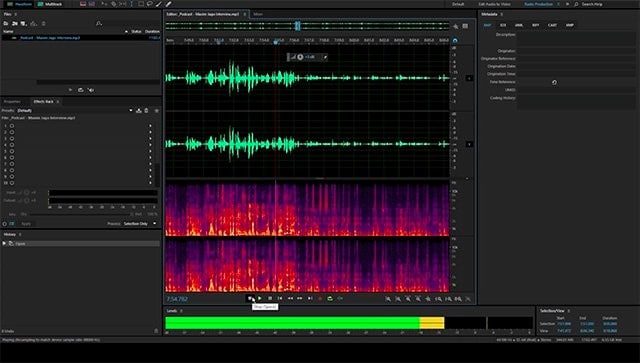
It is primarily designed for professional users having several features like multi-track editing and mixing, Auto Ducking, clip editing.
Pros:
- Availability of a vast range of features.
- Attractive user interface.
- Good for video sounds or voice-over editing overall, including sound mixing.
Cons:
- A little too complex for a newbie to understand.
- Not good enough for music productions.
- This software is subscription-based.
Audio formats support: MP3, WMA, WAV, AIFF, AC-3, PCM, AIFC, and more.
Compatibility: Mac OS, Windows.
Price: free and paid for both.
3. Logic Pro X
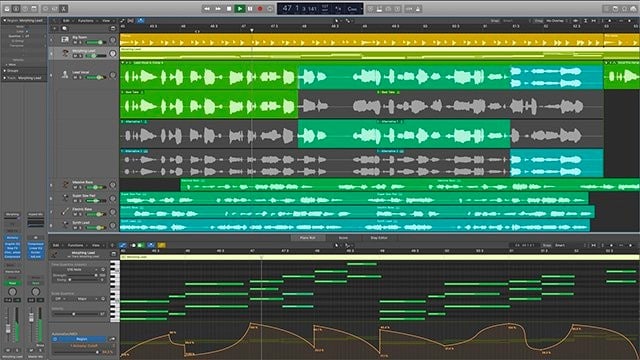
This software is suitable for both professional users and beginners. It combines all the basic and advanced features, including Flex Time, automatic time matching of different tracks, Flex Pitch, arpeggiator, etc.
Pros
- Works wonderfully on Mac.
- Rich Featured software and several plugins.
- Singular notes control.
- Tutorial easily available.
Cons:
- Mac only.
- Expensive.
Audio formats support: WAV, AIFF, CAF, PCM, ALAC, MP3, and more.
Compatibility: macOS.
Price: Paid
4. Audacity
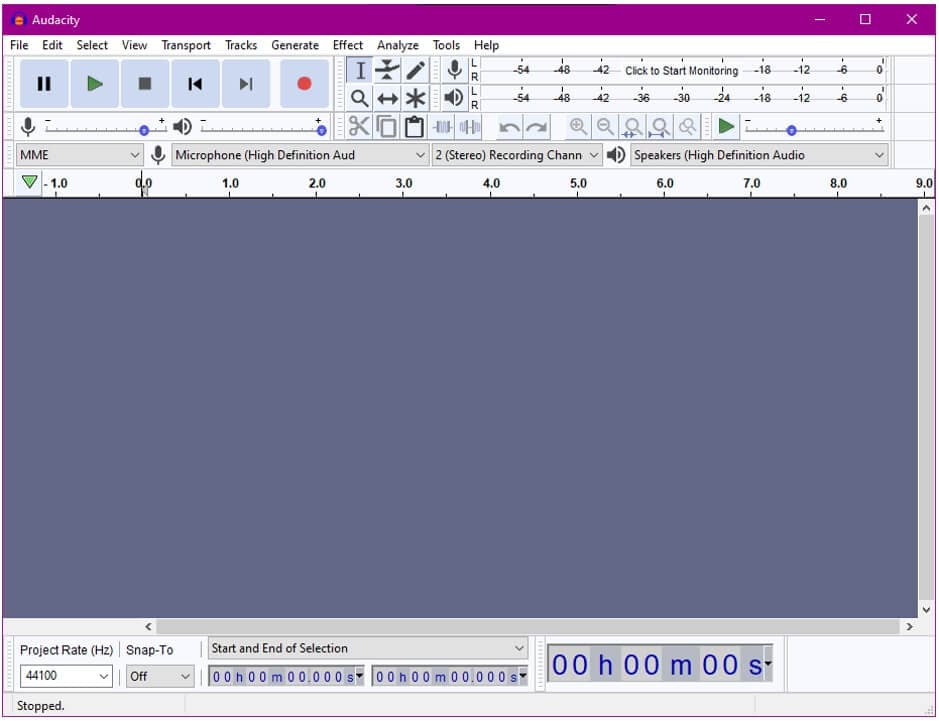
A free, open-source, and features rich software perfect for both professional and beginner users. Its offers multiple effects and tolls like analysis, envelope, time-shift tools, etc.
Pros
- Free.
- Cross-platform.
- Easy to use.
- Features for beginner and pro-level, both.
- Online community available for help.
Cons:
- Not very appealing UI.
- May face crashes on Mac.
Audio formats support: MP3, MP4, AIFF, PCM, WMA, AC3, AMR, and more.
Compatibility: Linux, Windows, and macOS.
Price : free.

Filmora Audio Mixer
Wondershare Filmora - Audio Mixer
• Easily mix audio, sound, music or song as your need
• Edit audio files like denoise, crop, audio ducking, audio auto synchronization, etc…
• Cross-platform supported - (Windows, Mac, iOS, Android)
Mix Your Audio Now Mix Your Audio Now Mix Your Audio Now Learn More >
5. Reaper
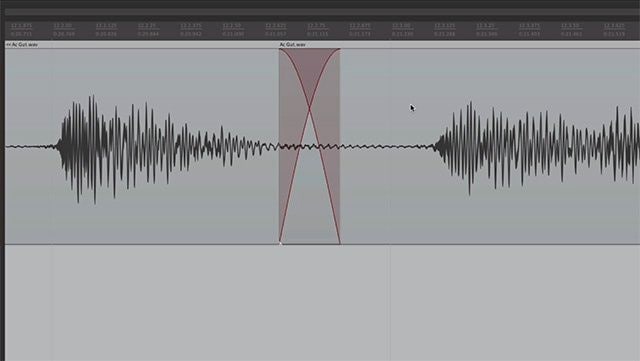
This is one of the few software facilities with a bunch of features at such an affordable price. It has multiple tracks, multichannel support, real-time, non-destructive effect application, pitch-shifting, and time-shifting features.
Pros
- Feature-rich.
- More affordable than other audio mixer software.
- Detailed tutorials are available online.
Cons:
- Not very appealing UI as of LPX or Audition.
- Not suitable for beginners.
Audio formats support ACID, AIFF, MP3, MPEG WMV, and more.
Compatibility: Linux, Windows, and macOS.
Price: free and paid.
6. Fl Studio
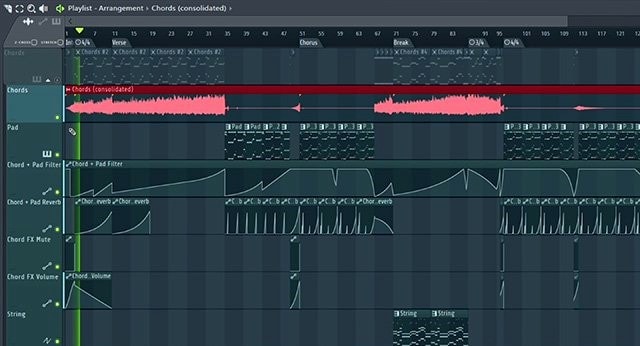
It is one of the top-notch software used for sound mixer and editing purposes. It supports pitch shifting, time stretching and multi-track recording, 80 plugins, VST standards, delay compensation, etc.
Pros
- Comes with abundant Features.
- Works great for music productions.
- Supports 3rd party plugin.
Cons:
- Not very appealing UI.
- May be intimidating for beginners.
Audio formats support: AIFF, DS, MP3, OGG, WAV and more.
Compatibility : Windows and macOS.
Price: free and paid.
7. SoundAtion
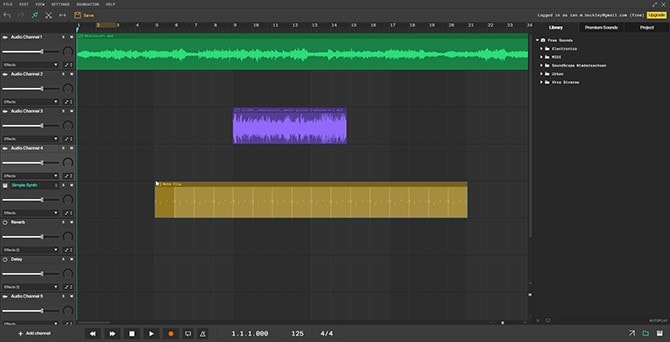
It is a browser-based software that facilitates non-destructive Multi-track audio editing, dynamic mixing, several effects selection, and EQ across multiple tracks.
Pros
- Free digital audio Workstation (DAW).
- Works wonderfully for sound effects, podcasting, and general-purpose sound task.
- Supports 3rd party plugin.
Cons:
- Automation not featured in a free trial.
- Limited audio quality in a trial version.
Audio Formats Support: MP3 and WAV.
Compatibility: any operating system.
Price : free and paid.
8. HyaWave
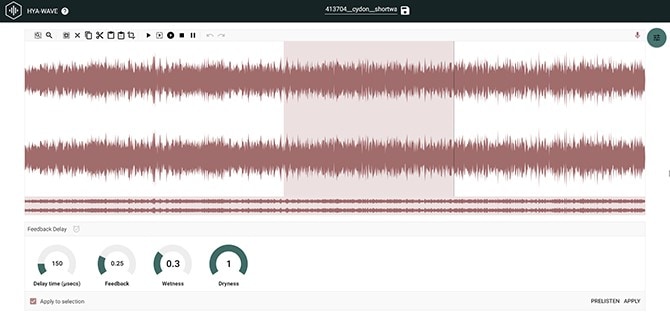
It offers functions like cutting with an online audio cutter, paste and trim audio, and supports 18 filters, effects, and publication through URL and social media with the minimalistic user interface.
Pros
- Easy and simple user interface.
- Audio filter customization.
- Has a built-in audio player, recorder, and editor.
Audio formats support: MP3, WAV, and more.
Compatibility : any operating system.
Price : free.
9. Twisted Wave Online
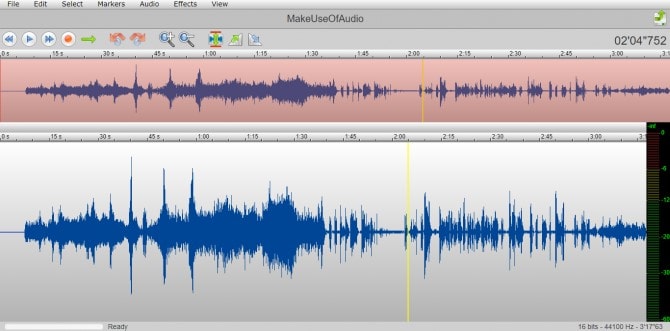
It is an online software almost equally compatible with many paid sound mixer and editing tools. It also supports uncompressed audio recording, VST effects, and several core effects.
Pros
- Cloud storage of edited audio, saving the disk space.
- Sampling rate conversation.
- Online and free.
Cons:
- Upload file in mono in a trial version.
- Supports 5 minutes audio clip in a trial version.
Audio formats support : MP3.
Compatibility: any operating system.
Price: free and paid.
10. Bear Audio Tool
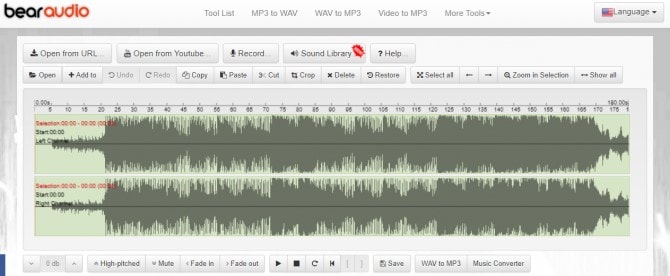
This is online browser-based software that can edit the files from our local storage, and you don’t have to upload the audio to their server. It can cut, apply effects, trim, etc. It has ample own music library, effects and import options.
Pros
- Copyright-free.
- Import audio directly from URL or social media domains.
- Features rich.
Cons:
- Not suitable for very advanced usage.
Audio formats support : MP3, OGG, WAV, WMA, M4R and OGG.
Compatibility : any operating system.
Price: free and paid.
Part 2. All You Know About Audio Mixer
[1] What is an audio mixer?
An audio mixer is used for several significant purposes. It is known with several names. Whether a mixing desk, soundboard, mixing board, audio mixer, or mixing console, all have a coherent purpose. The sole purpose of an audio mixer is to manage either the live or recorded event.
As the name suggests, audio mixing is the process of mixing multiple sounds and consolidating them into one or more channels.
This process is performed in a way that manipulates or enhances the dynamics, source’s volume level, panoramic position, and frequency content. The end moto of this creative and aesthetic treatment is to present the audio appealing to the listeners.

[2] What does an audio mixer do?
As mentioned above, the primary function of an audio mixer is to mix more than one audio signal and combine them into one or more output signals.
As an example, you may think of an audio mixing engineer, let’s say, orchestra conductor, who ensures that all the segregated sound sources mix into one harmonious soundtrack.
For this, they will use an audio mixer for filtering and optimizing sound by level adjusting, developing monitor feeds, using equalization and effects for sound enhancement.
This process is performed by a mixing engineer who operates either a digital audio workstation or a mixing console .
[3] What is audio mixing used for?
Audio mixing can be used in many fields, and it’s very common in our daily life, such as:
- 1. Music
- 2. Live sound
- 3. Film
- 4. Television

Filmora Audio Mixer
Wondershare Filmora - Audio Mixer
• Easily mix audio, sound, music or song as your need
• Edit audio files like denoise, crop, audio ducking, audio auto synchronization, etc…
• Cross-platform supported - (Windows, Mac, iOS, Android)
Mix Your Audio Now Mix Your Audio Now Mix Your Audio Now Learn More >
Part 3. What to consider while choosing an audio mixer software?
Before starting off with the audio mixing activity itself, one must be able to determine which audio mixer software is best for them with respect to their availability of resources or usability. Here are some of the factors to consider while opting for an audio mixer software:
- Check whether the software is paid or free.
- Check whether the limited features offered in a trial/free audio mixer software are enough to satisfy all your needs.
- Choose the paid or the free one depending on the extent of audio mixing quality you want.
- Look for an easy user interface.
- Look for software compatibility with your existing operating system.
- Check for the availability of tutorials related to the use of audio mixer software that you want to opt for better guidance.
- Look for the basic or advanced functions support in the audio mixer software that you choose depending upon your usability.
- Whether the software is available online or you need to install the version.
Part 4. Basic audio mixer settings you should know
It is necessary to know at least somewhat about the fundamental terminologies to decipher the specifications and features of an audio mixer. Here you’ll get to know what it takes to be able to distinguish among different audio mixers and their respective software.
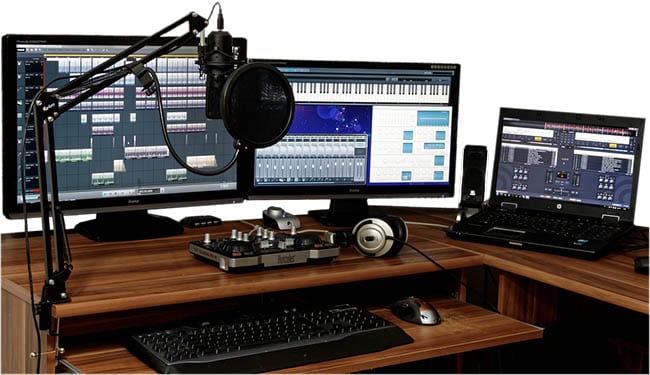
Channel:
It is a signal path. Channels are made to accept microphones, preamps, amplifiers, and signal processors. A mixer with several channels integrated with it allows several things to be integrated and routed through it.
Channel Strip:
It is a cluster of controls and circuits that works together on a specified mixing channel to manipulate the audio that passes through it. Some of which includes the following:
Input jack:
It is the jack where any external instrument, like guitar, microphone etc., integrates with the mixer. The noise and interface are minimized to maximum extent by balancing the XLR inputs. A quarter-inch TRS connector or RCA are connected to other inputs.
Microphone preamp:
It produces weak mic signals by the raise of line-level strength for processing.
Equalization:
Often abbreviated as “EQ”, is used to adjust the frequency response of a signal.
Dynamics:
This process is used to perform grating and compressing.
Routing:
It directs the incoming signals to external devices or mixer circuitry.
Fader:
Its fundamental objective is to control the inputs and outputs of a channel.
Meter:
Kind of a gauge or interface that presents the channel output.
I/O:
I/O is abbreviated as inputs/outputs on a mixer in this regards. The number and category of I/O will depend on the use of a mixer.
Now, let’s understand the scenario of live mixing.
Such a mixer is needed which is enough to handle the outputs needed to connect the mains, microphones, other devices that connect to it and monitor speakers. The devices that are a part of a recording process or signal chain must also be included while calculating I/O for studio mixers.
Such inputs/outputs include headphones, effects processors, monitor speakers, signal processors and other instruments as well that uses direct injection (DI) boxes to connect to the mixer.

Buses:
It can be understood as a circuit intersection where the outputs from different channels meet. The signal channels are routed to a specific bus or set of busses. The main mixer output to a recorder or a speaker by the master mix bus.
Auxiliary buses, often known as aux buses or aux sends, are usually fed by the channel’s volume controls with which they are connected and then send those signals through their own output jacks. This is called as post-fader sends which are used to send the mixes of monitor speakers, signals to headphones or effects processors.

Groups:
Several channels in a mixer often offer a group function that allows one to simultaneously process and control various channels. Its works are similar to that of sub-mixer that shares the coherent signal routing and processing and provides the ease in controlling master bus since a single fader is used to control all the channels.
Inserts:
External and add-on sound processors, such as equalizers and compressors, are connected with the help of a channel insert.
Direct Output:
These feed mixer’s preamplifiers output to recording systems and external sound interfaces.
Cue System:
Cue systems allow listening on the specified channels without affecting the mixer’s output. This usually allows the signal to listen either before fading manipulation or after.
Part 5. Why audio mixer software?
In the early days, analog audio mixers were the only option available to perform sounding mixing. But the rise of the era of the 21st century brings more opportunities for easy and optimized audio mixing by sound mixer software.
All you need is a configured laptop, audio mixer software, and merely a control surface to jump into this world while being within the budget!
This audio mixer software is easily available to do everything or even more than what a physical mixer could have done. Several sound mixer applications are available to start with basic sound mixing using your smartphones or even tablets.
For the sake of recording, software-based mixers allow easy integration with the virtual instruments, drum loops, samples, and several other additions in your productions. The use of advanced MIDI functions with a digital audio workstation (DAW) lets you enlighten with a whole new world of possibilities to elevate your sounds/music to the next level.
Final verdict: Have you decided on your audio mixer software?
The usability and optimality of a sound mixer online software depend solely on the extent of application, available resources, and OS compatibility.
But, it can be said without a doubt that Wondershare Filmora is the most user-friendly, with immense flexibility in terms of uses and compatibility. Its broad-scale usability and promising results make it outshine the most among other audio mixing software.

Benjamin Arango
Benjamin Arango is a writer and a lover of all things video.
Follow @Benjamin Arango
Benjamin Arango
Mar 27, 2024• Proven solutions
You may be a musician who wants to record their music, or just a person wanting to develop his custom ringtone. In either case, a physical or virtual audio mixer is required, whether it be analog or a dedicated audio mixer software.
But you need to have some technical knowledge to make optimal use and funk up your music/sound.
Here we are to give you the knowledge you need and some amazing audio mixer software that could be perfect for you. So buckle up, and get ready to level up the harmoniousness of your creativity!
You will Learn :
- Part 1. 10 Best Sound/Audio Mixer Software - [Video Guide]
- Part 2. All You Know About Audio Mixer
- Part 3. What to Consider While Choosing an Audio Mixer Software?
- Part 4. Basic Audio Mixer Settings You Should Know
- Part 5. Why Audio Mixer Software?
Part 1. 10 Best Sound/Audio Mixer Software
Whether you are pursuing a music career, making a video for a movie clip, or merely creating some hard-core beats for fun, you’ll be needing good sound mixing software.
Selecting an audio mixer software perfect for your requirements and available resources is not an easy task.
Some of them are for free while some charge for it, some offer limited features. At the same time, some are specific to a certain operating system, the options and availabilities are endless, and choosing among them is a hell of a daunting task.
But no need to stress out because we are here to take your burden on our shoulders and help you choose exactly what you want! So sit back and relax!
| 1 - Wondershare Filmora | 2 - Adobe Audition |
|---|---|
| 3 - Logic Pro X | 4 - Audacity |
| 5 - Reaper | 6 - Fl Studio |
| 7 - SoundAtion | 8 - HyaWave |
| 9 - Twisted Wave Online | 10 - Bear Audio Tool |
1. Wondershare Filmora
Filmora Audio Mixer is professional in audio mixing and video editing. This is used for mixing, balancing, and combining different sounds, and audio signals, sources like microphones, instruments, and synthesizers, or previously recorded audio.
Pros
- Imports audio file in the original format and mix the audio with built-in tools.
- Split, rearrange, and apply remix effects on added audio clips.
- Auto remix music to change audio length with high quality.
- Export audio files in MP3, FLAC, M4A, OGG, etc…
- Audio sync option while editing.
- Audio ducking features to lowers the background volume.
Audio formats support: all (import/export and audio/video) file formats.
Compatibility: Windows 7 to windows 10 sound mixer and mac OS.
Price: free and paid.
If you are facing any trouble regarding audio mixing through an audio mixer software, then here’s a video tutorial for Filmora software.
You can download it for free and follow the video guide step by step. Check the below video:
2. Adobe Audition

It is primarily designed for professional users having several features like multi-track editing and mixing, Auto Ducking, clip editing.
Pros:
- Availability of a vast range of features.
- Attractive user interface.
- Good for video sounds or voice-over editing overall, including sound mixing.
Cons:
- A little too complex for a newbie to understand.
- Not good enough for music productions.
- This software is subscription-based.
Audio formats support: MP3, WMA, WAV, AIFF, AC-3, PCM, AIFC, and more.
Compatibility: Mac OS, Windows.
Price: free and paid for both.
3. Logic Pro X

This software is suitable for both professional users and beginners. It combines all the basic and advanced features, including Flex Time, automatic time matching of different tracks, Flex Pitch, arpeggiator, etc.
Pros
- Works wonderfully on Mac.
- Rich Featured software and several plugins.
- Singular notes control.
- Tutorial easily available.
Cons:
- Mac only.
- Expensive.
Audio formats support: WAV, AIFF, CAF, PCM, ALAC, MP3, and more.
Compatibility: macOS.
Price: Paid
4. Audacity

A free, open-source, and features rich software perfect for both professional and beginner users. Its offers multiple effects and tolls like analysis, envelope, time-shift tools, etc.
Pros
- Free.
- Cross-platform.
- Easy to use.
- Features for beginner and pro-level, both.
- Online community available for help.
Cons:
- Not very appealing UI.
- May face crashes on Mac.
Audio formats support: MP3, MP4, AIFF, PCM, WMA, AC3, AMR, and more.
Compatibility: Linux, Windows, and macOS.
Price : free.

Filmora Audio Mixer
Wondershare Filmora - Audio Mixer
• Easily mix audio, sound, music or song as your need
• Edit audio files like denoise, crop, audio ducking, audio auto synchronization, etc…
• Cross-platform supported - (Windows, Mac, iOS, Android)
Mix Your Audio Now Mix Your Audio Now Mix Your Audio Now Learn More >
5. Reaper

This is one of the few software facilities with a bunch of features at such an affordable price. It has multiple tracks, multichannel support, real-time, non-destructive effect application, pitch-shifting, and time-shifting features.
Pros
- Feature-rich.
- More affordable than other audio mixer software.
- Detailed tutorials are available online.
Cons:
- Not very appealing UI as of LPX or Audition.
- Not suitable for beginners.
Audio formats support ACID, AIFF, MP3, MPEG WMV, and more.
Compatibility: Linux, Windows, and macOS.
Price: free and paid.
6. Fl Studio

It is one of the top-notch software used for sound mixer and editing purposes. It supports pitch shifting, time stretching and multi-track recording, 80 plugins, VST standards, delay compensation, etc.
Pros
- Comes with abundant Features.
- Works great for music productions.
- Supports 3rd party plugin.
Cons:
- Not very appealing UI.
- May be intimidating for beginners.
Audio formats support: AIFF, DS, MP3, OGG, WAV and more.
Compatibility : Windows and macOS.
Price: free and paid.
7. SoundAtion

It is a browser-based software that facilitates non-destructive Multi-track audio editing, dynamic mixing, several effects selection, and EQ across multiple tracks.
Pros
- Free digital audio Workstation (DAW).
- Works wonderfully for sound effects, podcasting, and general-purpose sound task.
- Supports 3rd party plugin.
Cons:
- Automation not featured in a free trial.
- Limited audio quality in a trial version.
Audio Formats Support: MP3 and WAV.
Compatibility: any operating system.
Price : free and paid.
8. HyaWave

It offers functions like cutting with an online audio cutter, paste and trim audio, and supports 18 filters, effects, and publication through URL and social media with the minimalistic user interface.
Pros
- Easy and simple user interface.
- Audio filter customization.
- Has a built-in audio player, recorder, and editor.
Audio formats support: MP3, WAV, and more.
Compatibility : any operating system.
Price : free.
9. Twisted Wave Online

It is an online software almost equally compatible with many paid sound mixer and editing tools. It also supports uncompressed audio recording, VST effects, and several core effects.
Pros
- Cloud storage of edited audio, saving the disk space.
- Sampling rate conversation.
- Online and free.
Cons:
- Upload file in mono in a trial version.
- Supports 5 minutes audio clip in a trial version.
Audio formats support : MP3.
Compatibility: any operating system.
Price: free and paid.
10. Bear Audio Tool

This is online browser-based software that can edit the files from our local storage, and you don’t have to upload the audio to their server. It can cut, apply effects, trim, etc. It has ample own music library, effects and import options.
Pros
- Copyright-free.
- Import audio directly from URL or social media domains.
- Features rich.
Cons:
- Not suitable for very advanced usage.
Audio formats support : MP3, OGG, WAV, WMA, M4R and OGG.
Compatibility : any operating system.
Price: free and paid.
Part 2. All You Know About Audio Mixer
[1] What is an audio mixer?
An audio mixer is used for several significant purposes. It is known with several names. Whether a mixing desk, soundboard, mixing board, audio mixer, or mixing console, all have a coherent purpose. The sole purpose of an audio mixer is to manage either the live or recorded event.
As the name suggests, audio mixing is the process of mixing multiple sounds and consolidating them into one or more channels.
This process is performed in a way that manipulates or enhances the dynamics, source’s volume level, panoramic position, and frequency content. The end moto of this creative and aesthetic treatment is to present the audio appealing to the listeners.

[2] What does an audio mixer do?
As mentioned above, the primary function of an audio mixer is to mix more than one audio signal and combine them into one or more output signals.
As an example, you may think of an audio mixing engineer, let’s say, orchestra conductor, who ensures that all the segregated sound sources mix into one harmonious soundtrack.
For this, they will use an audio mixer for filtering and optimizing sound by level adjusting, developing monitor feeds, using equalization and effects for sound enhancement.
This process is performed by a mixing engineer who operates either a digital audio workstation or a mixing console .
[3] What is audio mixing used for?
Audio mixing can be used in many fields, and it’s very common in our daily life, such as:
- 1. Music
- 2. Live sound
- 3. Film
- 4. Television

Filmora Audio Mixer
Wondershare Filmora - Audio Mixer
• Easily mix audio, sound, music or song as your need
• Edit audio files like denoise, crop, audio ducking, audio auto synchronization, etc…
• Cross-platform supported - (Windows, Mac, iOS, Android)
Mix Your Audio Now Mix Your Audio Now Mix Your Audio Now Learn More >
Part 3. What to consider while choosing an audio mixer software?
Before starting off with the audio mixing activity itself, one must be able to determine which audio mixer software is best for them with respect to their availability of resources or usability. Here are some of the factors to consider while opting for an audio mixer software:
- Check whether the software is paid or free.
- Check whether the limited features offered in a trial/free audio mixer software are enough to satisfy all your needs.
- Choose the paid or the free one depending on the extent of audio mixing quality you want.
- Look for an easy user interface.
- Look for software compatibility with your existing operating system.
- Check for the availability of tutorials related to the use of audio mixer software that you want to opt for better guidance.
- Look for the basic or advanced functions support in the audio mixer software that you choose depending upon your usability.
- Whether the software is available online or you need to install the version.
Part 4. Basic audio mixer settings you should know
It is necessary to know at least somewhat about the fundamental terminologies to decipher the specifications and features of an audio mixer. Here you’ll get to know what it takes to be able to distinguish among different audio mixers and their respective software.

Channel:
It is a signal path. Channels are made to accept microphones, preamps, amplifiers, and signal processors. A mixer with several channels integrated with it allows several things to be integrated and routed through it.
Channel Strip:
It is a cluster of controls and circuits that works together on a specified mixing channel to manipulate the audio that passes through it. Some of which includes the following:
Input jack:
It is the jack where any external instrument, like guitar, microphone etc., integrates with the mixer. The noise and interface are minimized to maximum extent by balancing the XLR inputs. A quarter-inch TRS connector or RCA are connected to other inputs.
Microphone preamp:
It produces weak mic signals by the raise of line-level strength for processing.
Equalization:
Often abbreviated as “EQ”, is used to adjust the frequency response of a signal.
Dynamics:
This process is used to perform grating and compressing.
Routing:
It directs the incoming signals to external devices or mixer circuitry.
Fader:
Its fundamental objective is to control the inputs and outputs of a channel.
Meter:
Kind of a gauge or interface that presents the channel output.
I/O:
I/O is abbreviated as inputs/outputs on a mixer in this regards. The number and category of I/O will depend on the use of a mixer.
Now, let’s understand the scenario of live mixing.
Such a mixer is needed which is enough to handle the outputs needed to connect the mains, microphones, other devices that connect to it and monitor speakers. The devices that are a part of a recording process or signal chain must also be included while calculating I/O for studio mixers.
Such inputs/outputs include headphones, effects processors, monitor speakers, signal processors and other instruments as well that uses direct injection (DI) boxes to connect to the mixer.

Buses:
It can be understood as a circuit intersection where the outputs from different channels meet. The signal channels are routed to a specific bus or set of busses. The main mixer output to a recorder or a speaker by the master mix bus.
Auxiliary buses, often known as aux buses or aux sends, are usually fed by the channel’s volume controls with which they are connected and then send those signals through their own output jacks. This is called as post-fader sends which are used to send the mixes of monitor speakers, signals to headphones or effects processors.

Groups:
Several channels in a mixer often offer a group function that allows one to simultaneously process and control various channels. Its works are similar to that of sub-mixer that shares the coherent signal routing and processing and provides the ease in controlling master bus since a single fader is used to control all the channels.
Inserts:
External and add-on sound processors, such as equalizers and compressors, are connected with the help of a channel insert.
Direct Output:
These feed mixer’s preamplifiers output to recording systems and external sound interfaces.
Cue System:
Cue systems allow listening on the specified channels without affecting the mixer’s output. This usually allows the signal to listen either before fading manipulation or after.
Part 5. Why audio mixer software?
In the early days, analog audio mixers were the only option available to perform sounding mixing. But the rise of the era of the 21st century brings more opportunities for easy and optimized audio mixing by sound mixer software.
All you need is a configured laptop, audio mixer software, and merely a control surface to jump into this world while being within the budget!
This audio mixer software is easily available to do everything or even more than what a physical mixer could have done. Several sound mixer applications are available to start with basic sound mixing using your smartphones or even tablets.
For the sake of recording, software-based mixers allow easy integration with the virtual instruments, drum loops, samples, and several other additions in your productions. The use of advanced MIDI functions with a digital audio workstation (DAW) lets you enlighten with a whole new world of possibilities to elevate your sounds/music to the next level.
Final verdict: Have you decided on your audio mixer software?
The usability and optimality of a sound mixer online software depend solely on the extent of application, available resources, and OS compatibility.
But, it can be said without a doubt that Wondershare Filmora is the most user-friendly, with immense flexibility in terms of uses and compatibility. Its broad-scale usability and promising results make it outshine the most among other audio mixing software.

Benjamin Arango
Benjamin Arango is a writer and a lover of all things video.
Follow @Benjamin Arango
Benjamin Arango
Mar 27, 2024• Proven solutions
You may be a musician who wants to record their music, or just a person wanting to develop his custom ringtone. In either case, a physical or virtual audio mixer is required, whether it be analog or a dedicated audio mixer software.
But you need to have some technical knowledge to make optimal use and funk up your music/sound.
Here we are to give you the knowledge you need and some amazing audio mixer software that could be perfect for you. So buckle up, and get ready to level up the harmoniousness of your creativity!
You will Learn :
- Part 1. 10 Best Sound/Audio Mixer Software - [Video Guide]
- Part 2. All You Know About Audio Mixer
- Part 3. What to Consider While Choosing an Audio Mixer Software?
- Part 4. Basic Audio Mixer Settings You Should Know
- Part 5. Why Audio Mixer Software?
Part 1. 10 Best Sound/Audio Mixer Software
Whether you are pursuing a music career, making a video for a movie clip, or merely creating some hard-core beats for fun, you’ll be needing good sound mixing software.
Selecting an audio mixer software perfect for your requirements and available resources is not an easy task.
Some of them are for free while some charge for it, some offer limited features. At the same time, some are specific to a certain operating system, the options and availabilities are endless, and choosing among them is a hell of a daunting task.
But no need to stress out because we are here to take your burden on our shoulders and help you choose exactly what you want! So sit back and relax!
| 1 - Wondershare Filmora | 2 - Adobe Audition |
|---|---|
| 3 - Logic Pro X | 4 - Audacity |
| 5 - Reaper | 6 - Fl Studio |
| 7 - SoundAtion | 8 - HyaWave |
| 9 - Twisted Wave Online | 10 - Bear Audio Tool |
1. Wondershare Filmora
Filmora Audio Mixer is professional in audio mixing and video editing. This is used for mixing, balancing, and combining different sounds, and audio signals, sources like microphones, instruments, and synthesizers, or previously recorded audio.
Pros
- Imports audio file in the original format and mix the audio with built-in tools.
- Split, rearrange, and apply remix effects on added audio clips.
- Auto remix music to change audio length with high quality.
- Export audio files in MP3, FLAC, M4A, OGG, etc…
- Audio sync option while editing.
- Audio ducking features to lowers the background volume.
Audio formats support: all (import/export and audio/video) file formats.
Compatibility: Windows 7 to windows 10 sound mixer and mac OS.
Price: free and paid.
If you are facing any trouble regarding audio mixing through an audio mixer software, then here’s a video tutorial for Filmora software.
You can download it for free and follow the video guide step by step. Check the below video:
2. Adobe Audition

It is primarily designed for professional users having several features like multi-track editing and mixing, Auto Ducking, clip editing.
Pros:
- Availability of a vast range of features.
- Attractive user interface.
- Good for video sounds or voice-over editing overall, including sound mixing.
Cons:
- A little too complex for a newbie to understand.
- Not good enough for music productions.
- This software is subscription-based.
Audio formats support: MP3, WMA, WAV, AIFF, AC-3, PCM, AIFC, and more.
Compatibility: Mac OS, Windows.
Price: free and paid for both.
3. Logic Pro X

This software is suitable for both professional users and beginners. It combines all the basic and advanced features, including Flex Time, automatic time matching of different tracks, Flex Pitch, arpeggiator, etc.
Pros
- Works wonderfully on Mac.
- Rich Featured software and several plugins.
- Singular notes control.
- Tutorial easily available.
Cons:
- Mac only.
- Expensive.
Audio formats support: WAV, AIFF, CAF, PCM, ALAC, MP3, and more.
Compatibility: macOS.
Price: Paid
4. Audacity

A free, open-source, and features rich software perfect for both professional and beginner users. Its offers multiple effects and tolls like analysis, envelope, time-shift tools, etc.
Pros
- Free.
- Cross-platform.
- Easy to use.
- Features for beginner and pro-level, both.
- Online community available for help.
Cons:
- Not very appealing UI.
- May face crashes on Mac.
Audio formats support: MP3, MP4, AIFF, PCM, WMA, AC3, AMR, and more.
Compatibility: Linux, Windows, and macOS.
Price : free.

Filmora Audio Mixer
Wondershare Filmora - Audio Mixer
• Easily mix audio, sound, music or song as your need
• Edit audio files like denoise, crop, audio ducking, audio auto synchronization, etc…
• Cross-platform supported - (Windows, Mac, iOS, Android)
Mix Your Audio Now Mix Your Audio Now Mix Your Audio Now Learn More >
5. Reaper

This is one of the few software facilities with a bunch of features at such an affordable price. It has multiple tracks, multichannel support, real-time, non-destructive effect application, pitch-shifting, and time-shifting features.
Pros
- Feature-rich.
- More affordable than other audio mixer software.
- Detailed tutorials are available online.
Cons:
- Not very appealing UI as of LPX or Audition.
- Not suitable for beginners.
Audio formats support ACID, AIFF, MP3, MPEG WMV, and more.
Compatibility: Linux, Windows, and macOS.
Price: free and paid.
6. Fl Studio

It is one of the top-notch software used for sound mixer and editing purposes. It supports pitch shifting, time stretching and multi-track recording, 80 plugins, VST standards, delay compensation, etc.
Pros
- Comes with abundant Features.
- Works great for music productions.
- Supports 3rd party plugin.
Cons:
- Not very appealing UI.
- May be intimidating for beginners.
Audio formats support: AIFF, DS, MP3, OGG, WAV and more.
Compatibility : Windows and macOS.
Price: free and paid.
7. SoundAtion

It is a browser-based software that facilitates non-destructive Multi-track audio editing, dynamic mixing, several effects selection, and EQ across multiple tracks.
Pros
- Free digital audio Workstation (DAW).
- Works wonderfully for sound effects, podcasting, and general-purpose sound task.
- Supports 3rd party plugin.
Cons:
- Automation not featured in a free trial.
- Limited audio quality in a trial version.
Audio Formats Support: MP3 and WAV.
Compatibility: any operating system.
Price : free and paid.
8. HyaWave

It offers functions like cutting with an online audio cutter, paste and trim audio, and supports 18 filters, effects, and publication through URL and social media with the minimalistic user interface.
Pros
- Easy and simple user interface.
- Audio filter customization.
- Has a built-in audio player, recorder, and editor.
Audio formats support: MP3, WAV, and more.
Compatibility : any operating system.
Price : free.
9. Twisted Wave Online

It is an online software almost equally compatible with many paid sound mixer and editing tools. It also supports uncompressed audio recording, VST effects, and several core effects.
Pros
- Cloud storage of edited audio, saving the disk space.
- Sampling rate conversation.
- Online and free.
Cons:
- Upload file in mono in a trial version.
- Supports 5 minutes audio clip in a trial version.
Audio formats support : MP3.
Compatibility: any operating system.
Price: free and paid.
10. Bear Audio Tool

This is online browser-based software that can edit the files from our local storage, and you don’t have to upload the audio to their server. It can cut, apply effects, trim, etc. It has ample own music library, effects and import options.
Pros
- Copyright-free.
- Import audio directly from URL or social media domains.
- Features rich.
Cons:
- Not suitable for very advanced usage.
Audio formats support : MP3, OGG, WAV, WMA, M4R and OGG.
Compatibility : any operating system.
Price: free and paid.
Part 2. All You Know About Audio Mixer
[1] What is an audio mixer?
An audio mixer is used for several significant purposes. It is known with several names. Whether a mixing desk, soundboard, mixing board, audio mixer, or mixing console, all have a coherent purpose. The sole purpose of an audio mixer is to manage either the live or recorded event.
As the name suggests, audio mixing is the process of mixing multiple sounds and consolidating them into one or more channels.
This process is performed in a way that manipulates or enhances the dynamics, source’s volume level, panoramic position, and frequency content. The end moto of this creative and aesthetic treatment is to present the audio appealing to the listeners.

[2] What does an audio mixer do?
As mentioned above, the primary function of an audio mixer is to mix more than one audio signal and combine them into one or more output signals.
As an example, you may think of an audio mixing engineer, let’s say, orchestra conductor, who ensures that all the segregated sound sources mix into one harmonious soundtrack.
For this, they will use an audio mixer for filtering and optimizing sound by level adjusting, developing monitor feeds, using equalization and effects for sound enhancement.
This process is performed by a mixing engineer who operates either a digital audio workstation or a mixing console .
[3] What is audio mixing used for?
Audio mixing can be used in many fields, and it’s very common in our daily life, such as:
- 1. Music
- 2. Live sound
- 3. Film
- 4. Television

Filmora Audio Mixer
Wondershare Filmora - Audio Mixer
• Easily mix audio, sound, music or song as your need
• Edit audio files like denoise, crop, audio ducking, audio auto synchronization, etc…
• Cross-platform supported - (Windows, Mac, iOS, Android)
Mix Your Audio Now Mix Your Audio Now Mix Your Audio Now Learn More >
Part 3. What to consider while choosing an audio mixer software?
Before starting off with the audio mixing activity itself, one must be able to determine which audio mixer software is best for them with respect to their availability of resources or usability. Here are some of the factors to consider while opting for an audio mixer software:
- Check whether the software is paid or free.
- Check whether the limited features offered in a trial/free audio mixer software are enough to satisfy all your needs.
- Choose the paid or the free one depending on the extent of audio mixing quality you want.
- Look for an easy user interface.
- Look for software compatibility with your existing operating system.
- Check for the availability of tutorials related to the use of audio mixer software that you want to opt for better guidance.
- Look for the basic or advanced functions support in the audio mixer software that you choose depending upon your usability.
- Whether the software is available online or you need to install the version.
Part 4. Basic audio mixer settings you should know
It is necessary to know at least somewhat about the fundamental terminologies to decipher the specifications and features of an audio mixer. Here you’ll get to know what it takes to be able to distinguish among different audio mixers and their respective software.

Channel:
It is a signal path. Channels are made to accept microphones, preamps, amplifiers, and signal processors. A mixer with several channels integrated with it allows several things to be integrated and routed through it.
Channel Strip:
It is a cluster of controls and circuits that works together on a specified mixing channel to manipulate the audio that passes through it. Some of which includes the following:
Input jack:
It is the jack where any external instrument, like guitar, microphone etc., integrates with the mixer. The noise and interface are minimized to maximum extent by balancing the XLR inputs. A quarter-inch TRS connector or RCA are connected to other inputs.
Microphone preamp:
It produces weak mic signals by the raise of line-level strength for processing.
Equalization:
Often abbreviated as “EQ”, is used to adjust the frequency response of a signal.
Dynamics:
This process is used to perform grating and compressing.
Routing:
It directs the incoming signals to external devices or mixer circuitry.
Fader:
Its fundamental objective is to control the inputs and outputs of a channel.
Meter:
Kind of a gauge or interface that presents the channel output.
I/O:
I/O is abbreviated as inputs/outputs on a mixer in this regards. The number and category of I/O will depend on the use of a mixer.
Now, let’s understand the scenario of live mixing.
Such a mixer is needed which is enough to handle the outputs needed to connect the mains, microphones, other devices that connect to it and monitor speakers. The devices that are a part of a recording process or signal chain must also be included while calculating I/O for studio mixers.
Such inputs/outputs include headphones, effects processors, monitor speakers, signal processors and other instruments as well that uses direct injection (DI) boxes to connect to the mixer.

Buses:
It can be understood as a circuit intersection where the outputs from different channels meet. The signal channels are routed to a specific bus or set of busses. The main mixer output to a recorder or a speaker by the master mix bus.
Auxiliary buses, often known as aux buses or aux sends, are usually fed by the channel’s volume controls with which they are connected and then send those signals through their own output jacks. This is called as post-fader sends which are used to send the mixes of monitor speakers, signals to headphones or effects processors.

Groups:
Several channels in a mixer often offer a group function that allows one to simultaneously process and control various channels. Its works are similar to that of sub-mixer that shares the coherent signal routing and processing and provides the ease in controlling master bus since a single fader is used to control all the channels.
Inserts:
External and add-on sound processors, such as equalizers and compressors, are connected with the help of a channel insert.
Direct Output:
These feed mixer’s preamplifiers output to recording systems and external sound interfaces.
Cue System:
Cue systems allow listening on the specified channels without affecting the mixer’s output. This usually allows the signal to listen either before fading manipulation or after.
Part 5. Why audio mixer software?
In the early days, analog audio mixers were the only option available to perform sounding mixing. But the rise of the era of the 21st century brings more opportunities for easy and optimized audio mixing by sound mixer software.
All you need is a configured laptop, audio mixer software, and merely a control surface to jump into this world while being within the budget!
This audio mixer software is easily available to do everything or even more than what a physical mixer could have done. Several sound mixer applications are available to start with basic sound mixing using your smartphones or even tablets.
For the sake of recording, software-based mixers allow easy integration with the virtual instruments, drum loops, samples, and several other additions in your productions. The use of advanced MIDI functions with a digital audio workstation (DAW) lets you enlighten with a whole new world of possibilities to elevate your sounds/music to the next level.
Final verdict: Have you decided on your audio mixer software?
The usability and optimality of a sound mixer online software depend solely on the extent of application, available resources, and OS compatibility.
But, it can be said without a doubt that Wondershare Filmora is the most user-friendly, with immense flexibility in terms of uses and compatibility. Its broad-scale usability and promising results make it outshine the most among other audio mixing software.

Benjamin Arango
Benjamin Arango is a writer and a lover of all things video.
Follow @Benjamin Arango
Benjamin Arango
Mar 27, 2024• Proven solutions
You may be a musician who wants to record their music, or just a person wanting to develop his custom ringtone. In either case, a physical or virtual audio mixer is required, whether it be analog or a dedicated audio mixer software.
But you need to have some technical knowledge to make optimal use and funk up your music/sound.
Here we are to give you the knowledge you need and some amazing audio mixer software that could be perfect for you. So buckle up, and get ready to level up the harmoniousness of your creativity!
You will Learn :
- Part 1. 10 Best Sound/Audio Mixer Software - [Video Guide]
- Part 2. All You Know About Audio Mixer
- Part 3. What to Consider While Choosing an Audio Mixer Software?
- Part 4. Basic Audio Mixer Settings You Should Know
- Part 5. Why Audio Mixer Software?
Part 1. 10 Best Sound/Audio Mixer Software
Whether you are pursuing a music career, making a video for a movie clip, or merely creating some hard-core beats for fun, you’ll be needing good sound mixing software.
Selecting an audio mixer software perfect for your requirements and available resources is not an easy task.
Some of them are for free while some charge for it, some offer limited features. At the same time, some are specific to a certain operating system, the options and availabilities are endless, and choosing among them is a hell of a daunting task.
But no need to stress out because we are here to take your burden on our shoulders and help you choose exactly what you want! So sit back and relax!
| 1 - Wondershare Filmora | 2 - Adobe Audition |
|---|---|
| 3 - Logic Pro X | 4 - Audacity |
| 5 - Reaper | 6 - Fl Studio |
| 7 - SoundAtion | 8 - HyaWave |
| 9 - Twisted Wave Online | 10 - Bear Audio Tool |
1. Wondershare Filmora
Filmora Audio Mixer is professional in audio mixing and video editing. This is used for mixing, balancing, and combining different sounds, and audio signals, sources like microphones, instruments, and synthesizers, or previously recorded audio.
Pros
- Imports audio file in the original format and mix the audio with built-in tools.
- Split, rearrange, and apply remix effects on added audio clips.
- Auto remix music to change audio length with high quality.
- Export audio files in MP3, FLAC, M4A, OGG, etc…
- Audio sync option while editing.
- Audio ducking features to lowers the background volume.
Audio formats support: all (import/export and audio/video) file formats.
Compatibility: Windows 7 to windows 10 sound mixer and mac OS.
Price: free and paid.
If you are facing any trouble regarding audio mixing through an audio mixer software, then here’s a video tutorial for Filmora software.
You can download it for free and follow the video guide step by step. Check the below video:
2. Adobe Audition

It is primarily designed for professional users having several features like multi-track editing and mixing, Auto Ducking, clip editing.
Pros:
- Availability of a vast range of features.
- Attractive user interface.
- Good for video sounds or voice-over editing overall, including sound mixing.
Cons:
- A little too complex for a newbie to understand.
- Not good enough for music productions.
- This software is subscription-based.
Audio formats support: MP3, WMA, WAV, AIFF, AC-3, PCM, AIFC, and more.
Compatibility: Mac OS, Windows.
Price: free and paid for both.
3. Logic Pro X

This software is suitable for both professional users and beginners. It combines all the basic and advanced features, including Flex Time, automatic time matching of different tracks, Flex Pitch, arpeggiator, etc.
Pros
- Works wonderfully on Mac.
- Rich Featured software and several plugins.
- Singular notes control.
- Tutorial easily available.
Cons:
- Mac only.
- Expensive.
Audio formats support: WAV, AIFF, CAF, PCM, ALAC, MP3, and more.
Compatibility: macOS.
Price: Paid
4. Audacity

A free, open-source, and features rich software perfect for both professional and beginner users. Its offers multiple effects and tolls like analysis, envelope, time-shift tools, etc.
Pros
- Free.
- Cross-platform.
- Easy to use.
- Features for beginner and pro-level, both.
- Online community available for help.
Cons:
- Not very appealing UI.
- May face crashes on Mac.
Audio formats support: MP3, MP4, AIFF, PCM, WMA, AC3, AMR, and more.
Compatibility: Linux, Windows, and macOS.
Price : free.

Filmora Audio Mixer
Wondershare Filmora - Audio Mixer
• Easily mix audio, sound, music or song as your need
• Edit audio files like denoise, crop, audio ducking, audio auto synchronization, etc…
• Cross-platform supported - (Windows, Mac, iOS, Android)
Mix Your Audio Now Mix Your Audio Now Mix Your Audio Now Learn More >
5. Reaper

This is one of the few software facilities with a bunch of features at such an affordable price. It has multiple tracks, multichannel support, real-time, non-destructive effect application, pitch-shifting, and time-shifting features.
Pros
- Feature-rich.
- More affordable than other audio mixer software.
- Detailed tutorials are available online.
Cons:
- Not very appealing UI as of LPX or Audition.
- Not suitable for beginners.
Audio formats support ACID, AIFF, MP3, MPEG WMV, and more.
Compatibility: Linux, Windows, and macOS.
Price: free and paid.
6. Fl Studio

It is one of the top-notch software used for sound mixer and editing purposes. It supports pitch shifting, time stretching and multi-track recording, 80 plugins, VST standards, delay compensation, etc.
Pros
- Comes with abundant Features.
- Works great for music productions.
- Supports 3rd party plugin.
Cons:
- Not very appealing UI.
- May be intimidating for beginners.
Audio formats support: AIFF, DS, MP3, OGG, WAV and more.
Compatibility : Windows and macOS.
Price: free and paid.
7. SoundAtion

It is a browser-based software that facilitates non-destructive Multi-track audio editing, dynamic mixing, several effects selection, and EQ across multiple tracks.
Pros
- Free digital audio Workstation (DAW).
- Works wonderfully for sound effects, podcasting, and general-purpose sound task.
- Supports 3rd party plugin.
Cons:
- Automation not featured in a free trial.
- Limited audio quality in a trial version.
Audio Formats Support: MP3 and WAV.
Compatibility: any operating system.
Price : free and paid.
8. HyaWave

It offers functions like cutting with an online audio cutter, paste and trim audio, and supports 18 filters, effects, and publication through URL and social media with the minimalistic user interface.
Pros
- Easy and simple user interface.
- Audio filter customization.
- Has a built-in audio player, recorder, and editor.
Audio formats support: MP3, WAV, and more.
Compatibility : any operating system.
Price : free.
9. Twisted Wave Online

It is an online software almost equally compatible with many paid sound mixer and editing tools. It also supports uncompressed audio recording, VST effects, and several core effects.
Pros
- Cloud storage of edited audio, saving the disk space.
- Sampling rate conversation.
- Online and free.
Cons:
- Upload file in mono in a trial version.
- Supports 5 minutes audio clip in a trial version.
Audio formats support : MP3.
Compatibility: any operating system.
Price: free and paid.
10. Bear Audio Tool

This is online browser-based software that can edit the files from our local storage, and you don’t have to upload the audio to their server. It can cut, apply effects, trim, etc. It has ample own music library, effects and import options.
Pros
- Copyright-free.
- Import audio directly from URL or social media domains.
- Features rich.
Cons:
- Not suitable for very advanced usage.
Audio formats support : MP3, OGG, WAV, WMA, M4R and OGG.
Compatibility : any operating system.
Price: free and paid.
Part 2. All You Know About Audio Mixer
[1] What is an audio mixer?
An audio mixer is used for several significant purposes. It is known with several names. Whether a mixing desk, soundboard, mixing board, audio mixer, or mixing console, all have a coherent purpose. The sole purpose of an audio mixer is to manage either the live or recorded event.
As the name suggests, audio mixing is the process of mixing multiple sounds and consolidating them into one or more channels.
This process is performed in a way that manipulates or enhances the dynamics, source’s volume level, panoramic position, and frequency content. The end moto of this creative and aesthetic treatment is to present the audio appealing to the listeners.

[2] What does an audio mixer do?
As mentioned above, the primary function of an audio mixer is to mix more than one audio signal and combine them into one or more output signals.
As an example, you may think of an audio mixing engineer, let’s say, orchestra conductor, who ensures that all the segregated sound sources mix into one harmonious soundtrack.
For this, they will use an audio mixer for filtering and optimizing sound by level adjusting, developing monitor feeds, using equalization and effects for sound enhancement.
This process is performed by a mixing engineer who operates either a digital audio workstation or a mixing console .
[3] What is audio mixing used for?
Audio mixing can be used in many fields, and it’s very common in our daily life, such as:
- 1. Music
- 2. Live sound
- 3. Film
- 4. Television

Filmora Audio Mixer
Wondershare Filmora - Audio Mixer
• Easily mix audio, sound, music or song as your need
• Edit audio files like denoise, crop, audio ducking, audio auto synchronization, etc…
• Cross-platform supported - (Windows, Mac, iOS, Android)
Mix Your Audio Now Mix Your Audio Now Mix Your Audio Now Learn More >
Part 3. What to consider while choosing an audio mixer software?
Before starting off with the audio mixing activity itself, one must be able to determine which audio mixer software is best for them with respect to their availability of resources or usability. Here are some of the factors to consider while opting for an audio mixer software:
- Check whether the software is paid or free.
- Check whether the limited features offered in a trial/free audio mixer software are enough to satisfy all your needs.
- Choose the paid or the free one depending on the extent of audio mixing quality you want.
- Look for an easy user interface.
- Look for software compatibility with your existing operating system.
- Check for the availability of tutorials related to the use of audio mixer software that you want to opt for better guidance.
- Look for the basic or advanced functions support in the audio mixer software that you choose depending upon your usability.
- Whether the software is available online or you need to install the version.
Part 4. Basic audio mixer settings you should know
It is necessary to know at least somewhat about the fundamental terminologies to decipher the specifications and features of an audio mixer. Here you’ll get to know what it takes to be able to distinguish among different audio mixers and their respective software.

Channel:
It is a signal path. Channels are made to accept microphones, preamps, amplifiers, and signal processors. A mixer with several channels integrated with it allows several things to be integrated and routed through it.
Channel Strip:
It is a cluster of controls and circuits that works together on a specified mixing channel to manipulate the audio that passes through it. Some of which includes the following:
Input jack:
It is the jack where any external instrument, like guitar, microphone etc., integrates with the mixer. The noise and interface are minimized to maximum extent by balancing the XLR inputs. A quarter-inch TRS connector or RCA are connected to other inputs.
Microphone preamp:
It produces weak mic signals by the raise of line-level strength for processing.
Equalization:
Often abbreviated as “EQ”, is used to adjust the frequency response of a signal.
Dynamics:
This process is used to perform grating and compressing.
Routing:
It directs the incoming signals to external devices or mixer circuitry.
Fader:
Its fundamental objective is to control the inputs and outputs of a channel.
Meter:
Kind of a gauge or interface that presents the channel output.
I/O:
I/O is abbreviated as inputs/outputs on a mixer in this regards. The number and category of I/O will depend on the use of a mixer.
Now, let’s understand the scenario of live mixing.
Such a mixer is needed which is enough to handle the outputs needed to connect the mains, microphones, other devices that connect to it and monitor speakers. The devices that are a part of a recording process or signal chain must also be included while calculating I/O for studio mixers.
Such inputs/outputs include headphones, effects processors, monitor speakers, signal processors and other instruments as well that uses direct injection (DI) boxes to connect to the mixer.

Buses:
It can be understood as a circuit intersection where the outputs from different channels meet. The signal channels are routed to a specific bus or set of busses. The main mixer output to a recorder or a speaker by the master mix bus.
Auxiliary buses, often known as aux buses or aux sends, are usually fed by the channel’s volume controls with which they are connected and then send those signals through their own output jacks. This is called as post-fader sends which are used to send the mixes of monitor speakers, signals to headphones or effects processors.

Groups:
Several channels in a mixer often offer a group function that allows one to simultaneously process and control various channels. Its works are similar to that of sub-mixer that shares the coherent signal routing and processing and provides the ease in controlling master bus since a single fader is used to control all the channels.
Inserts:
External and add-on sound processors, such as equalizers and compressors, are connected with the help of a channel insert.
Direct Output:
These feed mixer’s preamplifiers output to recording systems and external sound interfaces.
Cue System:
Cue systems allow listening on the specified channels without affecting the mixer’s output. This usually allows the signal to listen either before fading manipulation or after.
Part 5. Why audio mixer software?
In the early days, analog audio mixers were the only option available to perform sounding mixing. But the rise of the era of the 21st century brings more opportunities for easy and optimized audio mixing by sound mixer software.
All you need is a configured laptop, audio mixer software, and merely a control surface to jump into this world while being within the budget!
This audio mixer software is easily available to do everything or even more than what a physical mixer could have done. Several sound mixer applications are available to start with basic sound mixing using your smartphones or even tablets.
For the sake of recording, software-based mixers allow easy integration with the virtual instruments, drum loops, samples, and several other additions in your productions. The use of advanced MIDI functions with a digital audio workstation (DAW) lets you enlighten with a whole new world of possibilities to elevate your sounds/music to the next level.
Final verdict: Have you decided on your audio mixer software?
The usability and optimality of a sound mixer online software depend solely on the extent of application, available resources, and OS compatibility.
But, it can be said without a doubt that Wondershare Filmora is the most user-friendly, with immense flexibility in terms of uses and compatibility. Its broad-scale usability and promising results make it outshine the most among other audio mixing software.

Benjamin Arango
Benjamin Arango is a writer and a lover of all things video.
Follow @Benjamin Arango
“The Future of Filmmaking: Techniques for Automatic Audio and Video Synchronization “
4 Ways to Sync Audio to Video in Filmora and Premiere Pro

Shanoon Cox
Mar 27, 2024• Proven solutions
Watching a video out-of-sync is an extreme turn off. And having a perception that sync audio and video is easy can be misleading. Despite adding sound easily, the actuality lies in its variety of needed operations as well as precision, especially when you have multiple audios and video clips. Moreover, possessing no idea on proper procedure can serve as real headache.
Nonetheless, you are fortunately at the right place as we are going to introduce an advanced technology that can fulfill this motive. Reading this article will prove to be helpful for you as we will enlighten upon syncing audios smoothly on Filmora and Premiere Pro. If you are interested and never want synchronizing issues, have a look upon this post and learn about how to sync audio and video.
- Part 1: How to Automatically Sync Audio to Video with Filmora
- Part 2: How to Sync Audio to Video in Premiere Pro
- Part 3: How to Sync Audio to Video Manually in Premiere Pro
- Part 4: How to Sync Audio to Video with Plug in
Part 1: How to Automatically Sync Audio to Video with Filmora
Auto Audio Sync is one of the best features of Filmora Video Editor . It allows you to adjust the audio tempo to sync with the video. You can slow down or speed up the audio with the button and setting. Auto Audio Sync is the ability to sync video and audio together automatically. Moreover, it is an all-in-one video editor with powerful functionality and a fully stacked feature set. It makes professional video editing easy with an intuitive interface, drag-and-drop editing, and advanced video editing features.
Steps to Use Auto Audio Sync Tool
This tool is best as it gives a perfect result when you try to match your audio files with your video files. For example, you might have a YouTube channel, and you record your audio from a Microphone, your video from a webcam camera, and your screen from your computer. The audio directly from the camera could be a little faint, resulting from the recording being farther from where you are. While the audio from the microphone would give you a high-quality audio.
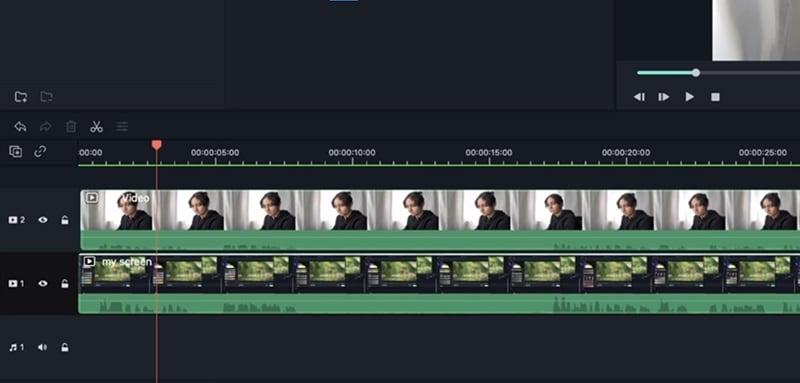
First, detach your audio file from your screen recording as the tool works with an audio file and a video file. Right-click on the audio file and click on detach audio to separate the audio file from the screen recording.
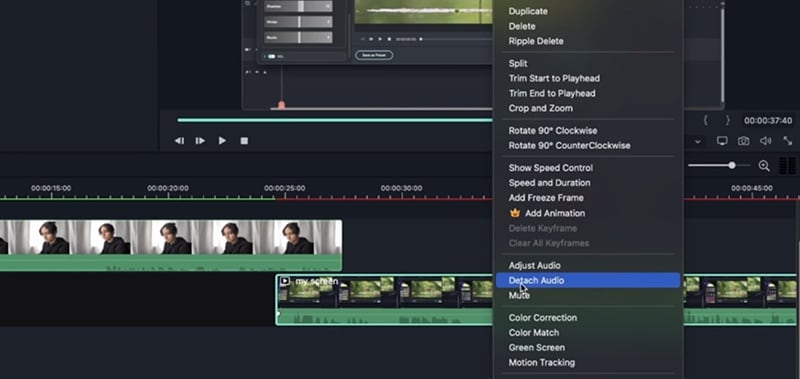
Return the audio file and the screen recording to the normal position, which gives you three layers on the timeline.

Next, select your audio and your video by making sure both footages are related to each other and then right-click and then tap the audio synchronization. This will sync the audio and the video together, and the echo will seize because the footage will perfectly match the audio.
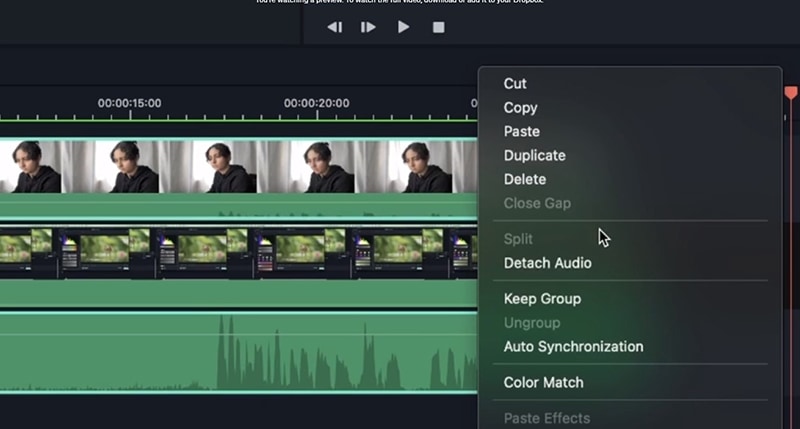
Part 2: How to Sync Audio to Video in Premiere Pro – Merging Audio and Video
The first way that can help you sync audio and video is merging the two files. You can simply get the media from the folders and this allows you to sync a max of 16 audio files to single video.
- To proceed, press Control and Command> key on Windows and Mac respectively. Now, pick out the two files that you want to merge. You will now get the Merge Clips menu having a list of options. Choose Audio option and click OK.
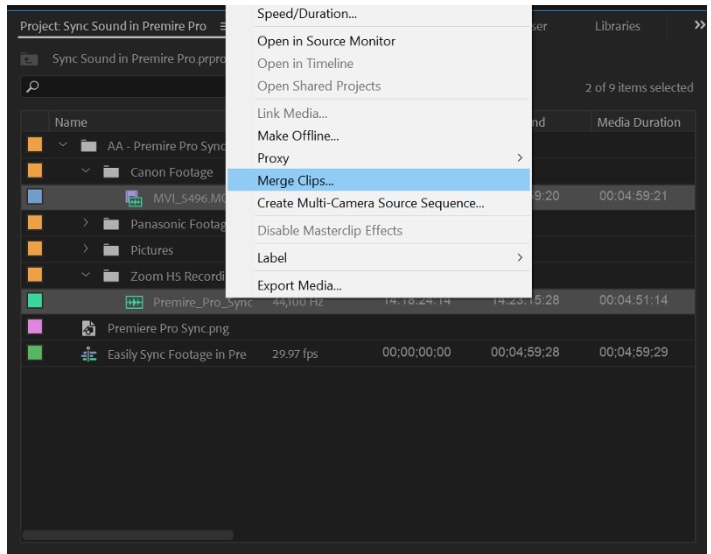
- Premiere Pro will now examine your video’s audio with the help of External audio and find out the similarities. In a couple of minutes, you will receive a new file with the name given to it in the Merge Clips menu.
Part 3: How to Sync Audio to Video Manually in Premiere Pro
- Step 1: Another is the manual way to sync audio to your videos. In order to work with this uncomplicated way of synchronization, get your video clip and the audio file into the timeline. Make sure to stack up the two files loosely (do not group them).
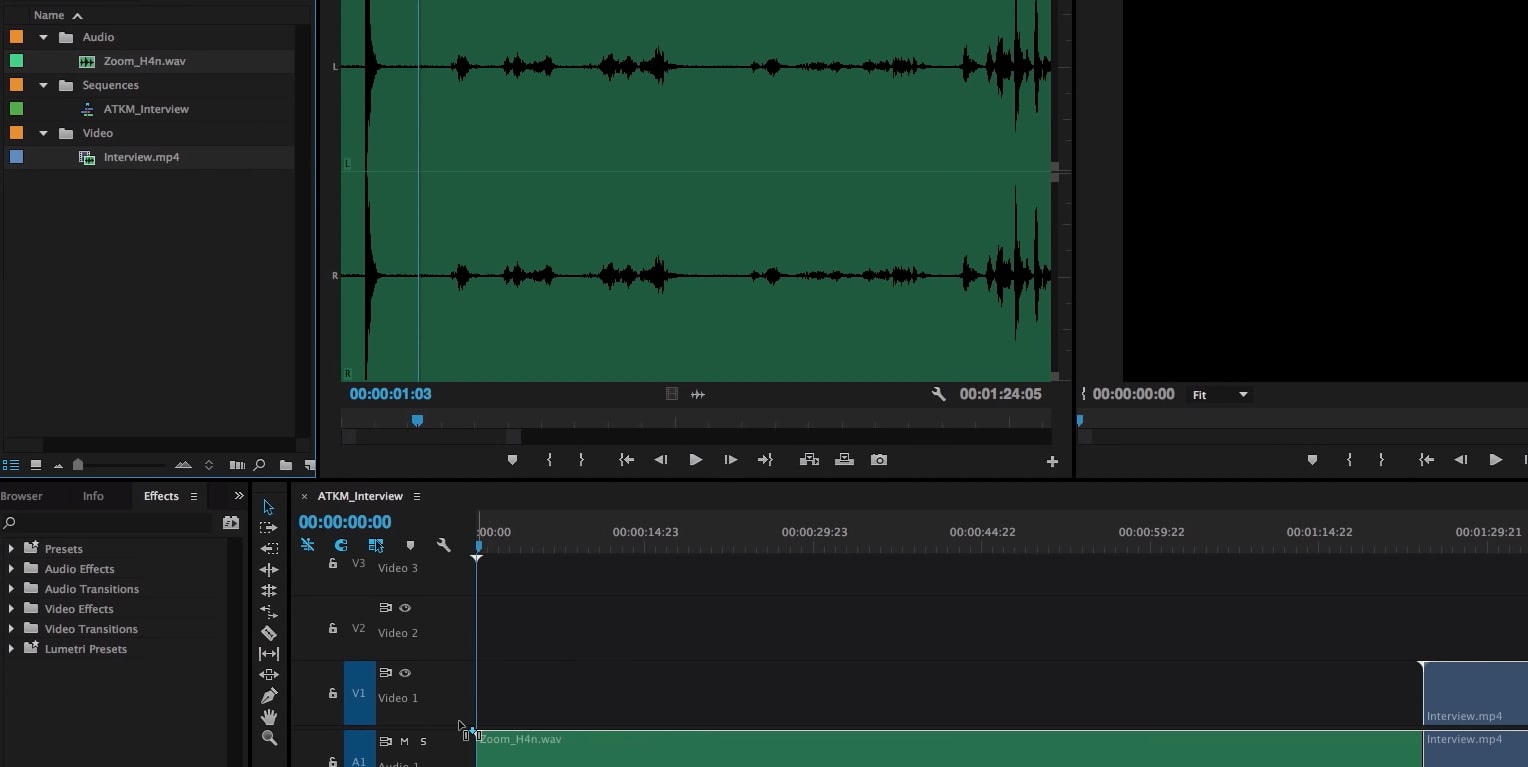
- Step 2: Now, you may have either used a professional slate/clapper or simply done a single clap with your hands to give a clue to start performing. All you need to do is to zoom the video file in the timeline. Look for the spike in waveforms that shows the slate. Where you notice the spike, slide the audio file and make the markers lined up.
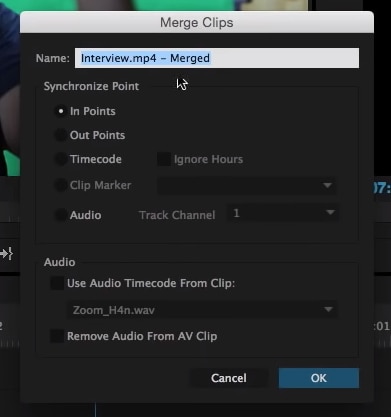
- Step 3: Start playing the clip to see if it works perfectly. Just in case, if a little tweaking is still required, click the audio file and hold down the Shift key while tapping left or right arrow key to adjust the audio file as per requirement.
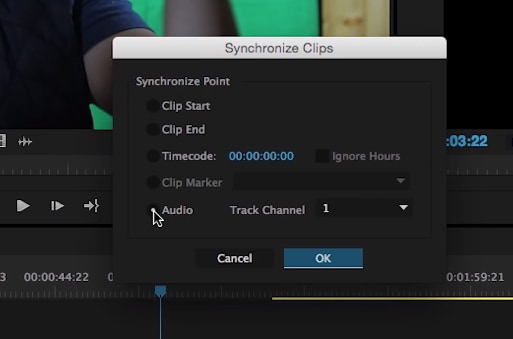
Part 4: How to Sync Audio to Video with Plug in
PluralEyes is the next ideal option to work with. It is a plug-in and comes for $200 from Red Giant. When you have the projects like documentaries which include numerous camera angles, PluralEyes easily handles such stuff and make audio and video synchronization easy for you.
- For this, run PluralEyes and hit on Add Media to import the clip. Alternatively, you can drag and drop the file directly to Premiere Pro. Now, click on Synchronize and let the program do the job.
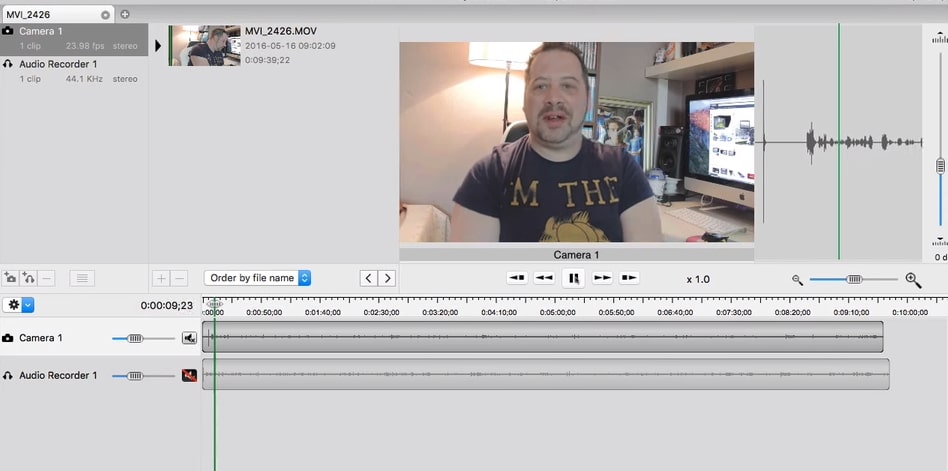
- You will notice the synced clips in green while the files that are not synchronized will show up in red as errors. In case there are files with the red error, you need to get to the Sync drop-down menu and click Try Really Hard.
- When the entire files are synced, hit on Export Timeline and you can then drag the exported project into Premiere Pro.
Bonus Tips: How to Record Audio Properly
Nothing is worse than a bad quality audio file. You must have always wanted to keep a high-quality audio file, correct? More than desire, it is a vital thing to have. Hence, to record your audio appropriately, you must have a quality microphone and an audio recorder that should stand out from others. This dual combination is significant in capturing the sound in an excellent quality and they indeed provide better output than an on-camera microphone.
The audio recorders with a little more price employ XLR cables. On the other hand, some affordable ones make use of the ideal headphone jacks i.e. 1/8” jacks.
You just need to have the right equipment with you when you are looking for the quality output for recording audio files.

Shanoon Cox
Shanoon Cox is a writer and a lover of all things video.
Follow @Shanoon Cox
Shanoon Cox
Mar 27, 2024• Proven solutions
Watching a video out-of-sync is an extreme turn off. And having a perception that sync audio and video is easy can be misleading. Despite adding sound easily, the actuality lies in its variety of needed operations as well as precision, especially when you have multiple audios and video clips. Moreover, possessing no idea on proper procedure can serve as real headache.
Nonetheless, you are fortunately at the right place as we are going to introduce an advanced technology that can fulfill this motive. Reading this article will prove to be helpful for you as we will enlighten upon syncing audios smoothly on Filmora and Premiere Pro. If you are interested and never want synchronizing issues, have a look upon this post and learn about how to sync audio and video.
- Part 1: How to Automatically Sync Audio to Video with Filmora
- Part 2: How to Sync Audio to Video in Premiere Pro
- Part 3: How to Sync Audio to Video Manually in Premiere Pro
- Part 4: How to Sync Audio to Video with Plug in
Part 1: How to Automatically Sync Audio to Video with Filmora
Auto Audio Sync is one of the best features of Filmora Video Editor . It allows you to adjust the audio tempo to sync with the video. You can slow down or speed up the audio with the button and setting. Auto Audio Sync is the ability to sync video and audio together automatically. Moreover, it is an all-in-one video editor with powerful functionality and a fully stacked feature set. It makes professional video editing easy with an intuitive interface, drag-and-drop editing, and advanced video editing features.
Steps to Use Auto Audio Sync Tool
This tool is best as it gives a perfect result when you try to match your audio files with your video files. For example, you might have a YouTube channel, and you record your audio from a Microphone, your video from a webcam camera, and your screen from your computer. The audio directly from the camera could be a little faint, resulting from the recording being farther from where you are. While the audio from the microphone would give you a high-quality audio.

First, detach your audio file from your screen recording as the tool works with an audio file and a video file. Right-click on the audio file and click on detach audio to separate the audio file from the screen recording.

Return the audio file and the screen recording to the normal position, which gives you three layers on the timeline.

Next, select your audio and your video by making sure both footages are related to each other and then right-click and then tap the audio synchronization. This will sync the audio and the video together, and the echo will seize because the footage will perfectly match the audio.

Part 2: How to Sync Audio to Video in Premiere Pro – Merging Audio and Video
The first way that can help you sync audio and video is merging the two files. You can simply get the media from the folders and this allows you to sync a max of 16 audio files to single video.
- To proceed, press Control and Command> key on Windows and Mac respectively. Now, pick out the two files that you want to merge. You will now get the Merge Clips menu having a list of options. Choose Audio option and click OK.

- Premiere Pro will now examine your video’s audio with the help of External audio and find out the similarities. In a couple of minutes, you will receive a new file with the name given to it in the Merge Clips menu.
Part 3: How to Sync Audio to Video Manually in Premiere Pro
- Step 1: Another is the manual way to sync audio to your videos. In order to work with this uncomplicated way of synchronization, get your video clip and the audio file into the timeline. Make sure to stack up the two files loosely (do not group them).

- Step 2: Now, you may have either used a professional slate/clapper or simply done a single clap with your hands to give a clue to start performing. All you need to do is to zoom the video file in the timeline. Look for the spike in waveforms that shows the slate. Where you notice the spike, slide the audio file and make the markers lined up.

- Step 3: Start playing the clip to see if it works perfectly. Just in case, if a little tweaking is still required, click the audio file and hold down the Shift key while tapping left or right arrow key to adjust the audio file as per requirement.

Part 4: How to Sync Audio to Video with Plug in
PluralEyes is the next ideal option to work with. It is a plug-in and comes for $200 from Red Giant. When you have the projects like documentaries which include numerous camera angles, PluralEyes easily handles such stuff and make audio and video synchronization easy for you.
- For this, run PluralEyes and hit on Add Media to import the clip. Alternatively, you can drag and drop the file directly to Premiere Pro. Now, click on Synchronize and let the program do the job.

- You will notice the synced clips in green while the files that are not synchronized will show up in red as errors. In case there are files with the red error, you need to get to the Sync drop-down menu and click Try Really Hard.
- When the entire files are synced, hit on Export Timeline and you can then drag the exported project into Premiere Pro.
Bonus Tips: How to Record Audio Properly
Nothing is worse than a bad quality audio file. You must have always wanted to keep a high-quality audio file, correct? More than desire, it is a vital thing to have. Hence, to record your audio appropriately, you must have a quality microphone and an audio recorder that should stand out from others. This dual combination is significant in capturing the sound in an excellent quality and they indeed provide better output than an on-camera microphone.
The audio recorders with a little more price employ XLR cables. On the other hand, some affordable ones make use of the ideal headphone jacks i.e. 1/8” jacks.
You just need to have the right equipment with you when you are looking for the quality output for recording audio files.

Shanoon Cox
Shanoon Cox is a writer and a lover of all things video.
Follow @Shanoon Cox
Shanoon Cox
Mar 27, 2024• Proven solutions
Watching a video out-of-sync is an extreme turn off. And having a perception that sync audio and video is easy can be misleading. Despite adding sound easily, the actuality lies in its variety of needed operations as well as precision, especially when you have multiple audios and video clips. Moreover, possessing no idea on proper procedure can serve as real headache.
Nonetheless, you are fortunately at the right place as we are going to introduce an advanced technology that can fulfill this motive. Reading this article will prove to be helpful for you as we will enlighten upon syncing audios smoothly on Filmora and Premiere Pro. If you are interested and never want synchronizing issues, have a look upon this post and learn about how to sync audio and video.
- Part 1: How to Automatically Sync Audio to Video with Filmora
- Part 2: How to Sync Audio to Video in Premiere Pro
- Part 3: How to Sync Audio to Video Manually in Premiere Pro
- Part 4: How to Sync Audio to Video with Plug in
Part 1: How to Automatically Sync Audio to Video with Filmora
Auto Audio Sync is one of the best features of Filmora Video Editor . It allows you to adjust the audio tempo to sync with the video. You can slow down or speed up the audio with the button and setting. Auto Audio Sync is the ability to sync video and audio together automatically. Moreover, it is an all-in-one video editor with powerful functionality and a fully stacked feature set. It makes professional video editing easy with an intuitive interface, drag-and-drop editing, and advanced video editing features.
Steps to Use Auto Audio Sync Tool
This tool is best as it gives a perfect result when you try to match your audio files with your video files. For example, you might have a YouTube channel, and you record your audio from a Microphone, your video from a webcam camera, and your screen from your computer. The audio directly from the camera could be a little faint, resulting from the recording being farther from where you are. While the audio from the microphone would give you a high-quality audio.

First, detach your audio file from your screen recording as the tool works with an audio file and a video file. Right-click on the audio file and click on detach audio to separate the audio file from the screen recording.

Return the audio file and the screen recording to the normal position, which gives you three layers on the timeline.

Next, select your audio and your video by making sure both footages are related to each other and then right-click and then tap the audio synchronization. This will sync the audio and the video together, and the echo will seize because the footage will perfectly match the audio.

Part 2: How to Sync Audio to Video in Premiere Pro – Merging Audio and Video
The first way that can help you sync audio and video is merging the two files. You can simply get the media from the folders and this allows you to sync a max of 16 audio files to single video.
- To proceed, press Control and Command> key on Windows and Mac respectively. Now, pick out the two files that you want to merge. You will now get the Merge Clips menu having a list of options. Choose Audio option and click OK.

- Premiere Pro will now examine your video’s audio with the help of External audio and find out the similarities. In a couple of minutes, you will receive a new file with the name given to it in the Merge Clips menu.
Part 3: How to Sync Audio to Video Manually in Premiere Pro
- Step 1: Another is the manual way to sync audio to your videos. In order to work with this uncomplicated way of synchronization, get your video clip and the audio file into the timeline. Make sure to stack up the two files loosely (do not group them).

- Step 2: Now, you may have either used a professional slate/clapper or simply done a single clap with your hands to give a clue to start performing. All you need to do is to zoom the video file in the timeline. Look for the spike in waveforms that shows the slate. Where you notice the spike, slide the audio file and make the markers lined up.

- Step 3: Start playing the clip to see if it works perfectly. Just in case, if a little tweaking is still required, click the audio file and hold down the Shift key while tapping left or right arrow key to adjust the audio file as per requirement.

Part 4: How to Sync Audio to Video with Plug in
PluralEyes is the next ideal option to work with. It is a plug-in and comes for $200 from Red Giant. When you have the projects like documentaries which include numerous camera angles, PluralEyes easily handles such stuff and make audio and video synchronization easy for you.
- For this, run PluralEyes and hit on Add Media to import the clip. Alternatively, you can drag and drop the file directly to Premiere Pro. Now, click on Synchronize and let the program do the job.

- You will notice the synced clips in green while the files that are not synchronized will show up in red as errors. In case there are files with the red error, you need to get to the Sync drop-down menu and click Try Really Hard.
- When the entire files are synced, hit on Export Timeline and you can then drag the exported project into Premiere Pro.
Bonus Tips: How to Record Audio Properly
Nothing is worse than a bad quality audio file. You must have always wanted to keep a high-quality audio file, correct? More than desire, it is a vital thing to have. Hence, to record your audio appropriately, you must have a quality microphone and an audio recorder that should stand out from others. This dual combination is significant in capturing the sound in an excellent quality and they indeed provide better output than an on-camera microphone.
The audio recorders with a little more price employ XLR cables. On the other hand, some affordable ones make use of the ideal headphone jacks i.e. 1/8” jacks.
You just need to have the right equipment with you when you are looking for the quality output for recording audio files.

Shanoon Cox
Shanoon Cox is a writer and a lover of all things video.
Follow @Shanoon Cox
Shanoon Cox
Mar 27, 2024• Proven solutions
Watching a video out-of-sync is an extreme turn off. And having a perception that sync audio and video is easy can be misleading. Despite adding sound easily, the actuality lies in its variety of needed operations as well as precision, especially when you have multiple audios and video clips. Moreover, possessing no idea on proper procedure can serve as real headache.
Nonetheless, you are fortunately at the right place as we are going to introduce an advanced technology that can fulfill this motive. Reading this article will prove to be helpful for you as we will enlighten upon syncing audios smoothly on Filmora and Premiere Pro. If you are interested and never want synchronizing issues, have a look upon this post and learn about how to sync audio and video.
- Part 1: How to Automatically Sync Audio to Video with Filmora
- Part 2: How to Sync Audio to Video in Premiere Pro
- Part 3: How to Sync Audio to Video Manually in Premiere Pro
- Part 4: How to Sync Audio to Video with Plug in
Part 1: How to Automatically Sync Audio to Video with Filmora
Auto Audio Sync is one of the best features of Filmora Video Editor . It allows you to adjust the audio tempo to sync with the video. You can slow down or speed up the audio with the button and setting. Auto Audio Sync is the ability to sync video and audio together automatically. Moreover, it is an all-in-one video editor with powerful functionality and a fully stacked feature set. It makes professional video editing easy with an intuitive interface, drag-and-drop editing, and advanced video editing features.
Steps to Use Auto Audio Sync Tool
This tool is best as it gives a perfect result when you try to match your audio files with your video files. For example, you might have a YouTube channel, and you record your audio from a Microphone, your video from a webcam camera, and your screen from your computer. The audio directly from the camera could be a little faint, resulting from the recording being farther from where you are. While the audio from the microphone would give you a high-quality audio.

First, detach your audio file from your screen recording as the tool works with an audio file and a video file. Right-click on the audio file and click on detach audio to separate the audio file from the screen recording.

Return the audio file and the screen recording to the normal position, which gives you three layers on the timeline.

Next, select your audio and your video by making sure both footages are related to each other and then right-click and then tap the audio synchronization. This will sync the audio and the video together, and the echo will seize because the footage will perfectly match the audio.

Part 2: How to Sync Audio to Video in Premiere Pro – Merging Audio and Video
The first way that can help you sync audio and video is merging the two files. You can simply get the media from the folders and this allows you to sync a max of 16 audio files to single video.
- To proceed, press Control and Command> key on Windows and Mac respectively. Now, pick out the two files that you want to merge. You will now get the Merge Clips menu having a list of options. Choose Audio option and click OK.

- Premiere Pro will now examine your video’s audio with the help of External audio and find out the similarities. In a couple of minutes, you will receive a new file with the name given to it in the Merge Clips menu.
Part 3: How to Sync Audio to Video Manually in Premiere Pro
- Step 1: Another is the manual way to sync audio to your videos. In order to work with this uncomplicated way of synchronization, get your video clip and the audio file into the timeline. Make sure to stack up the two files loosely (do not group them).

- Step 2: Now, you may have either used a professional slate/clapper or simply done a single clap with your hands to give a clue to start performing. All you need to do is to zoom the video file in the timeline. Look for the spike in waveforms that shows the slate. Where you notice the spike, slide the audio file and make the markers lined up.

- Step 3: Start playing the clip to see if it works perfectly. Just in case, if a little tweaking is still required, click the audio file and hold down the Shift key while tapping left or right arrow key to adjust the audio file as per requirement.

Part 4: How to Sync Audio to Video with Plug in
PluralEyes is the next ideal option to work with. It is a plug-in and comes for $200 from Red Giant. When you have the projects like documentaries which include numerous camera angles, PluralEyes easily handles such stuff and make audio and video synchronization easy for you.
- For this, run PluralEyes and hit on Add Media to import the clip. Alternatively, you can drag and drop the file directly to Premiere Pro. Now, click on Synchronize and let the program do the job.

- You will notice the synced clips in green while the files that are not synchronized will show up in red as errors. In case there are files with the red error, you need to get to the Sync drop-down menu and click Try Really Hard.
- When the entire files are synced, hit on Export Timeline and you can then drag the exported project into Premiere Pro.
Bonus Tips: How to Record Audio Properly
Nothing is worse than a bad quality audio file. You must have always wanted to keep a high-quality audio file, correct? More than desire, it is a vital thing to have. Hence, to record your audio appropriately, you must have a quality microphone and an audio recorder that should stand out from others. This dual combination is significant in capturing the sound in an excellent quality and they indeed provide better output than an on-camera microphone.
The audio recorders with a little more price employ XLR cables. On the other hand, some affordable ones make use of the ideal headphone jacks i.e. 1/8” jacks.
You just need to have the right equipment with you when you are looking for the quality output for recording audio files.

Shanoon Cox
Shanoon Cox is a writer and a lover of all things video.
Follow @Shanoon Cox
Also read:
- 6 Best Free Online Audio Editor to Use (100 Free)
- Essential Knowledge for Compiling a Top-Notch Auditory Archive on YouTube
- Updated Unveiling the Leading Audio Recording Apps of Todays Tech Scene
- Decoding The Criteria for Optimal Audio Post-Production Professionals
- Mass Momentum Surge Phenomenon
- New The Social Revolution of Clubhouse What It Promises for Interpersonal Connections and Digital Discourse for 2024
- New Achieving Pristine Audio Quality Tips to Eradicate Distorted Sounds in Visual Media
- 2024 Approved Voice to Word Made Easy Discovering the Best Free Android and iOS Transcription Tools
- New 2024 Approved Ultimate Soundscape Creators for Immersive Video Streaming
- New In 2024, How to Use Suspense Music to Master Film Score
- In 2024, The Definitive Guide to High-Quality Audio Edits on Apples Mobile Devices This Year
- Updated 2024 Approved The Ultimate Guide to Audio Recorders for Windows PCs Top 10 Picks
- Updated 2024 Approved Enhance Your Visual Storytelling with Music The Top 15 Online Tools for a Harmonious Blend of Sounds and Images
- Updated 15 Melodic Matchmakers Tailoring Audio to Each Videos Characteristic Mood for 2024
- Top 5 Android Sound Editing Tools Essential Apps Unveiled
- Updated 2024 Approved Three Methods for Transforming Your Podcast Into MP3 Format
- In 2024, Linux Masterclass Comparing the Best Audio Workflow Tools Available This Year
- Updated Vocal Virtuoso Analyzing the Top Audio Enhancers and Mixers for Musicians
- How To Remove or Bypass Knox Enrollment Service On Vivo V30 Pro
- In 2024, How to Intercept Text Messages on Vivo X90S | Dr.fone
- Updated In 2024, Top 5 Best Free WMV Video Editors
- In 2024, How To Use Special Features - Virtual Location On Apple iPhone 14 Pro Max? | Dr.fone
- Top Apps and Online Tools To Track Samsung Galaxy A25 5G Phone With/Without IMEI Number
- New TikTok Aspect Ratio Explained Tips and Tricks Success
- In 2024, For People Wanting to Mock GPS on Vivo X Flip Devices | Dr.fone
- Fix Cant Take Screenshot Due to Security Policy on Vivo V29 Pro | Dr.fone
- In 2024, All You Need To Know About Mega Greninja For Oppo Reno 11 Pro 5G | Dr.fone
- In 2024, Preparation to Beat Giovani in Pokemon Go For Vivo Y100i | Dr.fone
- In 2024, Are You Eager to Discover the Method of Video Scaling in Filmora? You Are in the Right Place because This Discussion Will Cover the Content on This Matter
- New 2024 Approved The Recommended Natural AI Hindi Voice Generator
- Super Easy Ways To Deal with Vivo G2 Unresponsive Screen | Dr.fone
- In 2024, iSpoofer is not working On Infinix Note 30i? Fixed | Dr.fone
- In 2024, All About iPhone SE Unlock Chip You Need to Know
- Title: Updated Exploring Sources of High-Frequency Glass Disintegration Sounds
- Author: Ella
- Created at : 2024-05-19 06:26:11
- Updated at : 2024-05-20 06:26:11
- Link: https://sound-optimizing.techidaily.com/updated-exploring-sources-of-high-frequency-glass-disintegration-sounds/
- License: This work is licensed under CC BY-NC-SA 4.0.

